Claude Forthomme's Blog, page 57
February 17, 2012
The Americans Have a Tea Party, the Europeans a Beer Party: Angela Merkel's!
A peculiarity of our times: extremist political ideologies. They used to rise mostly on the left (Hitler and Mussolini were both socialists). Now they emerge on the right. The Americans have a Tea Party, the Europeans have a Beer Party, with Angela Merkel calling the shots.
Both parties are totally convinced they're right and everybody else is wrong. Both have one goal in mind: curb the role of government.
Who's behind the European Beer Party? Angela Merkel, of course. The European press is full of her - even staid financial newspapers like the Italian Sole 24 Ore. Here's their cover picture of their week-end magazine IL (it came out last Saturday):

Note the subtitle: MUTTER MUTLOS: "Mother Without Courage". For some Germans, she's too soft on fellow Europeans - the reason why she's taken on the battle against bailing out the Euro: she has no intentions of losing her political majority. Indeed, a majority of Germans (some 60%) see no reason why they should bailout Greece or anybody for that matter - forgetting that all these Southern Europeans they despise are major markets (correction here: some German insustrialists do know this and are not all that happy with Merkel). Consider the spread of Germany over Europe. Ten million Germans go to Spain every year for their vacation. German Deutsche Telekom controls the Greek telephone company and German Fraport has acquired 55% of Athens airport.Over 1,400 German enterprises are present on the Italian market, selling for a total €73 billion. Germany holds €123,5 billion of the French public debt.
I could go on and on, but you get the idea: European economies are deeply interlinked. The Euro is just a reflection of that inter-linkage - no, not a reflection, it's more than that. It makes exchange and trade easier, faster and less costly. Just like the American dollar links big, rich states like Texas or California with small, poor states like West Virginia or Mississippi. Which is why the German idea that the Euro was a non starter because it linked countries as diverse as Germany and Greece is plain wrong. Yet some important German intellectuals like the writer and poet Hans Magnus Enzensberger hold just that view! How can they?
It is astonishing how ignorant people are when it comes to economics. And that ignorance is reflected in the politicians they elect. Look more closely at Merkel, here's another amazing photo (still from IL Magazine):

She looks so young, doesn't she? She looks just like an East German University student! But she was actually much older on that picture, already 38. It was taken in May 1992, some 20 years ago, when she had just been appointed by Helmut Kohl as his Minister for Women and Youth. Note the somber, serious look: there's the shadow of the Soviet Empire on that face - East German bureaucratic Kultur. There's also a hint of Lutheran austerity. Her father was a Lutheran minister, and no doubt her mother who taught Latin was a very serious person too.
But look closely at her eyes:

Do you see any light in them? Nothing? Grim determination, yes. Imagination? Mmmm, no comment. It should come as no surprise that she studied (and majored) in physical chemistry...numbers, formulas, no knowledge of human nature or history. Not exactly the best preparation to understand economics...
Have Angela Merkel's eyes improved with time? Let's take a look at them up close (still using the IL Magazine cover image):

Bright blue! Her eyes look more vivacious, don't they? But look again: this photo was very carefully taken, with two lights on the left and right of her face, to give it balance. The lights reflect in the eyes - two bright spots on the right and left of the pupil - thus ensuring that special brilliance. But if you move down to the mouth, you see she's not smiling:

No, the message is clear. Toe the line, kiddies, behave! Your government budget is like your household budget: it has to balance out, for the individual: every month, for the government: every year!
I've written elsewhere that the two kinds of budget are not identical, far from it. The public budget belongs to a community not a single individual family and it has to be balanced over time, not every year. When I say "over time", I mean the medium to long term, at least 10 years. Anything else makes no sense at all.
Not so for the European Beer Party. It has embraced the German ideology of balanced budgets and taken Greece as an emblematic example of immoral profligacy and corrupt government practices based on clientelism and privilege. Austerity is not just the Beer Party's key slogan. It is a comprehensive set of measures to balance budgets and use as a bludgeon to whip not only Greece but all wayward Euro-zone members and force them to toe the line of fiscal discipline.
The most recent and biggest Beer Party victory came when 24 EU members at the last Euro Summit agreed to write the principle of balanced budgets into their constitution (the UK is famously among those who have opted out).
The Beer Party is playing a tough game: last Sunday (February 12), while the street was up in arms, the Greek Parliament voted austerity measures at the behest of the European Union, IMF and European Central Bank. The Greeks were told that if they didn't vote, they wouldn't get their €130billion bailout in time to avoid default and that the European Finance Ministers would hold a meeting Wednesday (February 15) to decide on it.
Wednesday came and went and no decisions. Now the Greeks are told that a decision would come at the next Eurogroup meeting on Monday February 20... Maybe so, maybe not. This is disgusting brinkmanship at the expense of Greece whose economy has shrunk since the crisis started by some 15% and whose unemployment rate has shot up steadily, now hovering around 20% and twice that level for the young. Indeed, young Greeks are trying to flee Greece and find jobs abroad if they can...
In times of recession and economic contraction, austerity is a recipe for disaster. In Greece's case, the numbers are now in to prove it: as the economy contracts, tax revenues are down and the deficit grows bigger. At this rate, the debt problem will never be solved. Incidentally, things aren't going much better for Ireland or Portugal...
What's needed is economic growth: without measures to restore growth, the spiral can only accelerate down. Fortunately there's one politician in Europe who keeps saying that, and it's Italy's Prime Minister Monti. He's the only one who makes sense against Merkel's austerity obsession - but then he's not a politician, he's an economist and a technocrat...
This said, there's little doubt that Southern Europe is paying the price of wanting the cake and easting it too. Tax evasion and the "submerged economy" are so large that there's not a chance to ever balance the budget without cutting into the practices of bloating the bureaucracy to satisfy nepotism, of padding public pension funds, multiplying fake invalidity payments, handing out free medecines that are then traded for a profit etc etc Personally, I would give priority to fighting tax evasion and forcing businessmen out of the submerged economy rather than slap on higher indirect taxes on everybody (which give additional incentives to take refuge in the submerged economy). And I would give priority to reforming the bureaucratic apparatus and welfare system, to weed out the more obvious cases of systematic corruption and theft.
So Merkel is not totally wrong. And her insistence on austerity might really help put the European House in order. Let's just hope that she'll relent and allow for Euro-salvaging measures like quantitative easing before the European House collapses...Also because if Europe collapses, there's a real danger of contagion, and America could plunge back into recession.
Hey, we're all in this together!
Related articlesAngela Merkel and the politics of doom (marketwatch.com)
The Fake Angela Merkel On Twitter Gets A Shout-Out From A Wall Street Research Report (businessinsider.com)



Both parties are totally convinced they're right and everybody else is wrong. Both have one goal in mind: curb the role of government.
Who's behind the European Beer Party? Angela Merkel, of course. The European press is full of her - even staid financial newspapers like the Italian Sole 24 Ore. Here's their cover picture of their week-end magazine IL (it came out last Saturday):

Note the subtitle: MUTTER MUTLOS: "Mother Without Courage". For some Germans, she's too soft on fellow Europeans - the reason why she's taken on the battle against bailing out the Euro: she has no intentions of losing her political majority. Indeed, a majority of Germans (some 60%) see no reason why they should bailout Greece or anybody for that matter - forgetting that all these Southern Europeans they despise are major markets (correction here: some German insustrialists do know this and are not all that happy with Merkel). Consider the spread of Germany over Europe. Ten million Germans go to Spain every year for their vacation. German Deutsche Telekom controls the Greek telephone company and German Fraport has acquired 55% of Athens airport.Over 1,400 German enterprises are present on the Italian market, selling for a total €73 billion. Germany holds €123,5 billion of the French public debt.
I could go on and on, but you get the idea: European economies are deeply interlinked. The Euro is just a reflection of that inter-linkage - no, not a reflection, it's more than that. It makes exchange and trade easier, faster and less costly. Just like the American dollar links big, rich states like Texas or California with small, poor states like West Virginia or Mississippi. Which is why the German idea that the Euro was a non starter because it linked countries as diverse as Germany and Greece is plain wrong. Yet some important German intellectuals like the writer and poet Hans Magnus Enzensberger hold just that view! How can they?
It is astonishing how ignorant people are when it comes to economics. And that ignorance is reflected in the politicians they elect. Look more closely at Merkel, here's another amazing photo (still from IL Magazine):

She looks so young, doesn't she? She looks just like an East German University student! But she was actually much older on that picture, already 38. It was taken in May 1992, some 20 years ago, when she had just been appointed by Helmut Kohl as his Minister for Women and Youth. Note the somber, serious look: there's the shadow of the Soviet Empire on that face - East German bureaucratic Kultur. There's also a hint of Lutheran austerity. Her father was a Lutheran minister, and no doubt her mother who taught Latin was a very serious person too.
But look closely at her eyes:

Do you see any light in them? Nothing? Grim determination, yes. Imagination? Mmmm, no comment. It should come as no surprise that she studied (and majored) in physical chemistry...numbers, formulas, no knowledge of human nature or history. Not exactly the best preparation to understand economics...
Have Angela Merkel's eyes improved with time? Let's take a look at them up close (still using the IL Magazine cover image):

Bright blue! Her eyes look more vivacious, don't they? But look again: this photo was very carefully taken, with two lights on the left and right of her face, to give it balance. The lights reflect in the eyes - two bright spots on the right and left of the pupil - thus ensuring that special brilliance. But if you move down to the mouth, you see she's not smiling:

No, the message is clear. Toe the line, kiddies, behave! Your government budget is like your household budget: it has to balance out, for the individual: every month, for the government: every year!
I've written elsewhere that the two kinds of budget are not identical, far from it. The public budget belongs to a community not a single individual family and it has to be balanced over time, not every year. When I say "over time", I mean the medium to long term, at least 10 years. Anything else makes no sense at all.
Not so for the European Beer Party. It has embraced the German ideology of balanced budgets and taken Greece as an emblematic example of immoral profligacy and corrupt government practices based on clientelism and privilege. Austerity is not just the Beer Party's key slogan. It is a comprehensive set of measures to balance budgets and use as a bludgeon to whip not only Greece but all wayward Euro-zone members and force them to toe the line of fiscal discipline.
The most recent and biggest Beer Party victory came when 24 EU members at the last Euro Summit agreed to write the principle of balanced budgets into their constitution (the UK is famously among those who have opted out).
The Beer Party is playing a tough game: last Sunday (February 12), while the street was up in arms, the Greek Parliament voted austerity measures at the behest of the European Union, IMF and European Central Bank. The Greeks were told that if they didn't vote, they wouldn't get their €130billion bailout in time to avoid default and that the European Finance Ministers would hold a meeting Wednesday (February 15) to decide on it.
Wednesday came and went and no decisions. Now the Greeks are told that a decision would come at the next Eurogroup meeting on Monday February 20... Maybe so, maybe not. This is disgusting brinkmanship at the expense of Greece whose economy has shrunk since the crisis started by some 15% and whose unemployment rate has shot up steadily, now hovering around 20% and twice that level for the young. Indeed, young Greeks are trying to flee Greece and find jobs abroad if they can...
In times of recession and economic contraction, austerity is a recipe for disaster. In Greece's case, the numbers are now in to prove it: as the economy contracts, tax revenues are down and the deficit grows bigger. At this rate, the debt problem will never be solved. Incidentally, things aren't going much better for Ireland or Portugal...
What's needed is economic growth: without measures to restore growth, the spiral can only accelerate down. Fortunately there's one politician in Europe who keeps saying that, and it's Italy's Prime Minister Monti. He's the only one who makes sense against Merkel's austerity obsession - but then he's not a politician, he's an economist and a technocrat...
This said, there's little doubt that Southern Europe is paying the price of wanting the cake and easting it too. Tax evasion and the "submerged economy" are so large that there's not a chance to ever balance the budget without cutting into the practices of bloating the bureaucracy to satisfy nepotism, of padding public pension funds, multiplying fake invalidity payments, handing out free medecines that are then traded for a profit etc etc Personally, I would give priority to fighting tax evasion and forcing businessmen out of the submerged economy rather than slap on higher indirect taxes on everybody (which give additional incentives to take refuge in the submerged economy). And I would give priority to reforming the bureaucratic apparatus and welfare system, to weed out the more obvious cases of systematic corruption and theft.
So Merkel is not totally wrong. And her insistence on austerity might really help put the European House in order. Let's just hope that she'll relent and allow for Euro-salvaging measures like quantitative easing before the European House collapses...Also because if Europe collapses, there's a real danger of contagion, and America could plunge back into recession.
Hey, we're all in this together!
Related articlesAngela Merkel and the politics of doom (marketwatch.com)
The Fake Angela Merkel On Twitter Gets A Shout-Out From A Wall Street Research Report (businessinsider.com)


Published on February 17, 2012 02:12
February 12, 2012
Rome under the Snow, Part II: The Real Story Behind the Polemics
Snow storms hit Rome yesterday, February 11th, but polemics raged all week. Here's the snow storm hitting my street:

And here's how Villa Volkonsky, the residence of the British Ambassador in Rome, looked hidden behind a double curtain of trees and snow:

Yet, more than the snow, the talk on Italian television and the media was not the snow but polemics surrounding the emergency.
Here's the story behind the polemics.
It's a fact (as I documented in my previous post) that the snow emergency last week caught the city totally unprepared. The images of Rome waking up the following morning under the snow were beautiful, but the beauty couldn't hide the fury of Roman citizens. They had been caught in traffic the night before during a home rush hour that in some cases lasted...eight hours! The next day they were stuck at home, public transport had broken down, even the metro was inaccessible and the supermarkets were empty. No milk, fruits, vegetables or fruit. Unthinkable!
Whose fault was it? How could a modern metropolis of three million inhabitants be caught unprepared?
All eyes accusingly turned to the the Mayor of Rome, Gianni Alemanno:
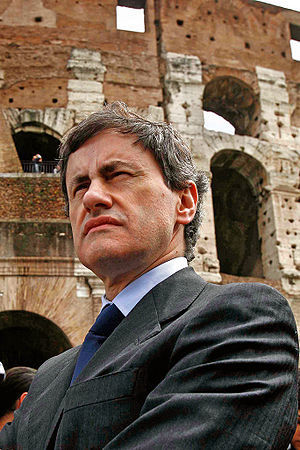 Image via Wikipedia
Image via Wikipedia
He should have warned the citizenry! He should have called the army in, he should have done something! Yet that first night, as the snowfall intensified all he had done was limiting himself to issue a warning that snow tires or chains were obligatory. The next morning, when 50 cm of snow had covered Rome, there was no one to shovel the snow, no means to clear the streets. In the afternoon, only a handful of people were used to clear the access to the football stadium, while the rest of the city remained paralyzed.
The Mayor of course had a ready rebuttal: it was the fault of the "Protezione Civile" - that's the Italian state agency that is supposed to be responsible for the protection of citizens and organizing emergency aid in cases of natural disasters. The Protezione Civile, created 30 years ago, has earned high marks handling Italian natural disasters, most recently during the earthquake that hit Aquila in 2009, the deadliest earthquake since the Irpinia one in 1980. It left over 300 dead, 65,000 people were made homeless and thousands of buildings in several medieval towns, in particular the Aquila, were damaged .
So Alemanno passed the bucket and accused the Protezione Civile. A lot of Romans did not appreciate. The Protezione had done its duty: it had given ample warning of the impending disaster. It was up to the Mayor to take the necessary measures.
Say that again? Wasn't preventing disasters and organizing emergency aid the job of the Protezione Civile? Wasn't that what it was supposed to do, what it had been created for?
Apparently not. Following the Aquila episode, the Protezione Civile's mandate had been reduced from organizing and providing aid to merely coordinating it. And as anyone who's been involved in emergency aid knows (I have been, I know - in my work for FAO, I travelled to Kosovo, Ethiopia and Eritrea), with coordination you don't get very far in an emergency. To do things you need means, and you need them fast.
But the funds and power to obtain means had been taken away from the Protezione Civile. It was now up to mayors and local authorities to obtain funds and means - and if the town was too small, or like Rome lacked funds (too much spent on public concerts rather than on serious stuff), then there was only one way out: seek help from the Ministry of Interior.
Imagine that, having to go through a long-winded bureaucratic procedure to obtain the means to address an emergency!
That means you wait two, three days or more before you can get any help. Result: not only Rome suffered (but fortunately for Romans it turned out to be a minor inconvenience), but people outside Rome suffered more, especially those living in small towns and villages in the mountains.
Imagine, numerous villages around Italy, especially in the Abruzzi and in Basilicata, found themselves totally isolated for days - up to 5 days and more... going without electricity and water! And in sub-zero temperatures! And with food reserves growing scarce!
That, as Guido Bertolaso said on his blog, is unacceptable for a modern, advanced democracy. Bertolaso? He's the previous head of the Protezione Civile (from 2001 to 2010), now retired - he was forcefully removed from his job, more on that in a minute.
So the polemics swelled and Alemanno, the Mayor of Rome, pulled his act together and when a warning came that a second snowfall would hit Rome by Friday 10th, he was ready. Salt and sand bags had been brought, shovels distributed, trucks and other means mobilized, as necessary.
Indeed, on Saturday morning, I woke up to the sound of shovels raking the streets. Here are the men in orange suits, armed in shovels, in front of the British Embassy:
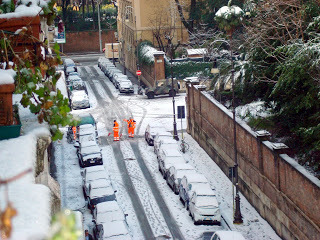
Yes, not working very hard. Five minutes later, they were leaving, shovels on their shoulders:
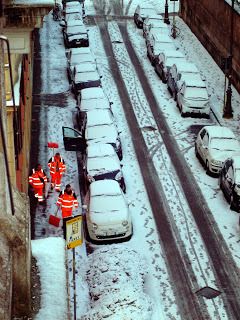
They were right of course, the snow was already melting. I thought I'd join in the effort and took the shovel the city had given us after the first snowfall:
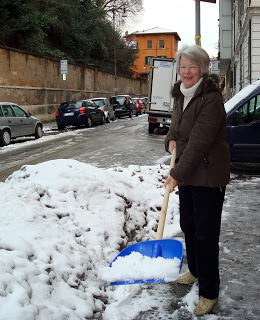
I never thought I'd be shoveling snow in Rome one day! But if you look closely at the photo, you'll see there was no real need for it anymore. Indeed, a few minutes later, this is how the Church of San Giovanni looked, splendid under the (customary) Roman sun, with only wet streets as a reminder of what had happened:
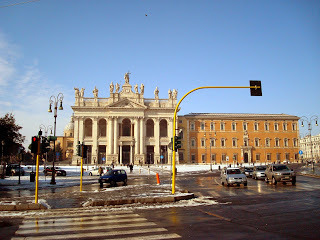
Back to normal? No, the polemic was raging and I wanted to know what was the real story behind it. I asked around and dug into recent history.
This is what I found.
It all began after the Aquila earthquake. A nasty polemic developed around Bertolaso who was at the time the head of the Protezione Civile and considered a hero by many. Berlusconi, then Prime Minister, had asked him to move the G20 meeting, originally intended to take place in La Maddalena to Aquila in July 2009 - a foolish idea considering the region had just been struck by an earthquake and the priority should have been on reconstruction and giving homes to displaced people. But Berlusconi wanted to show the world what a brilliant manager he was. And he counted on Bertolaso's exceptional organizational skills.
But something went wrong. Maybe hubris, maybe the lax approach that was a mark of Berlusconi's management style, maybe irresistible temptations, maybe the little time available before the G20 meeting, who knows - no matter the reason, the fact is that Bertolaso ended up being accused of squandering state funds on dubious contractors.
The scandal at the time was enormous. For many, it looked like a national hero was unfairly under attack. But since there were growing proofs of wrongdoing, Tremonti, then Finance Minister and a moral purist, took a major decision: he presented to Parliament a law decree (the "Multiproroghe") that, among other things, was designed to take away from the Protezione Civile any funds or power for implementing emergency aid and left it with only an ill-defined general "coordination" role.
The law was passed in February 2011 and Bertolaso went home (actually he had left before).
With the present snow emergency, this law decree caused a mess: nobody knew who was supposed to do what, and with whose funds. Many people were left with the impression that the Protezione Civile was still the one in authority, when it no longer was. That had been clearly the misconception the Mayor of Rome had labored under - him and probably many others.
To put an end to the mess, on 8 February, the Monti government published a decree (here's the link) that clearly spells out who does what at every level of government: regional, provincial and local and this at the behest of the Protezione Civile.
So is the Protezione Civile back in power? Not quite: the decree only refers to the "exceptional weather adversity of February 2012". So what will happen with the next emergency, say next month or a year from now?
Your guess is as good as mine...
 Bertolaso - when he was still running the show (Image via Wikipedia)
Bertolaso - when he was still running the show (Image via Wikipedia)




And here's how Villa Volkonsky, the residence of the British Ambassador in Rome, looked hidden behind a double curtain of trees and snow:

Yet, more than the snow, the talk on Italian television and the media was not the snow but polemics surrounding the emergency.
Here's the story behind the polemics.
It's a fact (as I documented in my previous post) that the snow emergency last week caught the city totally unprepared. The images of Rome waking up the following morning under the snow were beautiful, but the beauty couldn't hide the fury of Roman citizens. They had been caught in traffic the night before during a home rush hour that in some cases lasted...eight hours! The next day they were stuck at home, public transport had broken down, even the metro was inaccessible and the supermarkets were empty. No milk, fruits, vegetables or fruit. Unthinkable!
Whose fault was it? How could a modern metropolis of three million inhabitants be caught unprepared?
All eyes accusingly turned to the the Mayor of Rome, Gianni Alemanno:
 Image via Wikipedia
Image via WikipediaHe should have warned the citizenry! He should have called the army in, he should have done something! Yet that first night, as the snowfall intensified all he had done was limiting himself to issue a warning that snow tires or chains were obligatory. The next morning, when 50 cm of snow had covered Rome, there was no one to shovel the snow, no means to clear the streets. In the afternoon, only a handful of people were used to clear the access to the football stadium, while the rest of the city remained paralyzed.
The Mayor of course had a ready rebuttal: it was the fault of the "Protezione Civile" - that's the Italian state agency that is supposed to be responsible for the protection of citizens and organizing emergency aid in cases of natural disasters. The Protezione Civile, created 30 years ago, has earned high marks handling Italian natural disasters, most recently during the earthquake that hit Aquila in 2009, the deadliest earthquake since the Irpinia one in 1980. It left over 300 dead, 65,000 people were made homeless and thousands of buildings in several medieval towns, in particular the Aquila, were damaged .
So Alemanno passed the bucket and accused the Protezione Civile. A lot of Romans did not appreciate. The Protezione had done its duty: it had given ample warning of the impending disaster. It was up to the Mayor to take the necessary measures.
Say that again? Wasn't preventing disasters and organizing emergency aid the job of the Protezione Civile? Wasn't that what it was supposed to do, what it had been created for?
Apparently not. Following the Aquila episode, the Protezione Civile's mandate had been reduced from organizing and providing aid to merely coordinating it. And as anyone who's been involved in emergency aid knows (I have been, I know - in my work for FAO, I travelled to Kosovo, Ethiopia and Eritrea), with coordination you don't get very far in an emergency. To do things you need means, and you need them fast.
But the funds and power to obtain means had been taken away from the Protezione Civile. It was now up to mayors and local authorities to obtain funds and means - and if the town was too small, or like Rome lacked funds (too much spent on public concerts rather than on serious stuff), then there was only one way out: seek help from the Ministry of Interior.
Imagine that, having to go through a long-winded bureaucratic procedure to obtain the means to address an emergency!
That means you wait two, three days or more before you can get any help. Result: not only Rome suffered (but fortunately for Romans it turned out to be a minor inconvenience), but people outside Rome suffered more, especially those living in small towns and villages in the mountains.
Imagine, numerous villages around Italy, especially in the Abruzzi and in Basilicata, found themselves totally isolated for days - up to 5 days and more... going without electricity and water! And in sub-zero temperatures! And with food reserves growing scarce!
That, as Guido Bertolaso said on his blog, is unacceptable for a modern, advanced democracy. Bertolaso? He's the previous head of the Protezione Civile (from 2001 to 2010), now retired - he was forcefully removed from his job, more on that in a minute.
So the polemics swelled and Alemanno, the Mayor of Rome, pulled his act together and when a warning came that a second snowfall would hit Rome by Friday 10th, he was ready. Salt and sand bags had been brought, shovels distributed, trucks and other means mobilized, as necessary.
Indeed, on Saturday morning, I woke up to the sound of shovels raking the streets. Here are the men in orange suits, armed in shovels, in front of the British Embassy:

Yes, not working very hard. Five minutes later, they were leaving, shovels on their shoulders:

They were right of course, the snow was already melting. I thought I'd join in the effort and took the shovel the city had given us after the first snowfall:

I never thought I'd be shoveling snow in Rome one day! But if you look closely at the photo, you'll see there was no real need for it anymore. Indeed, a few minutes later, this is how the Church of San Giovanni looked, splendid under the (customary) Roman sun, with only wet streets as a reminder of what had happened:

Back to normal? No, the polemic was raging and I wanted to know what was the real story behind it. I asked around and dug into recent history.
This is what I found.
It all began after the Aquila earthquake. A nasty polemic developed around Bertolaso who was at the time the head of the Protezione Civile and considered a hero by many. Berlusconi, then Prime Minister, had asked him to move the G20 meeting, originally intended to take place in La Maddalena to Aquila in July 2009 - a foolish idea considering the region had just been struck by an earthquake and the priority should have been on reconstruction and giving homes to displaced people. But Berlusconi wanted to show the world what a brilliant manager he was. And he counted on Bertolaso's exceptional organizational skills.
But something went wrong. Maybe hubris, maybe the lax approach that was a mark of Berlusconi's management style, maybe irresistible temptations, maybe the little time available before the G20 meeting, who knows - no matter the reason, the fact is that Bertolaso ended up being accused of squandering state funds on dubious contractors.
The scandal at the time was enormous. For many, it looked like a national hero was unfairly under attack. But since there were growing proofs of wrongdoing, Tremonti, then Finance Minister and a moral purist, took a major decision: he presented to Parliament a law decree (the "Multiproroghe") that, among other things, was designed to take away from the Protezione Civile any funds or power for implementing emergency aid and left it with only an ill-defined general "coordination" role.
The law was passed in February 2011 and Bertolaso went home (actually he had left before).
With the present snow emergency, this law decree caused a mess: nobody knew who was supposed to do what, and with whose funds. Many people were left with the impression that the Protezione Civile was still the one in authority, when it no longer was. That had been clearly the misconception the Mayor of Rome had labored under - him and probably many others.
To put an end to the mess, on 8 February, the Monti government published a decree (here's the link) that clearly spells out who does what at every level of government: regional, provincial and local and this at the behest of the Protezione Civile.
So is the Protezione Civile back in power? Not quite: the decree only refers to the "exceptional weather adversity of February 2012". So what will happen with the next emergency, say next month or a year from now?
Your guess is as good as mine...
 Bertolaso - when he was still running the show (Image via Wikipedia)
Bertolaso - when he was still running the show (Image via Wikipedia)

Published on February 12, 2012 11:51
February 9, 2012
1% against 99%: the Real Story behind the Euro Crisis
The Euro crisis, the move to austerity measures and budget deficit reduction, the disregard for policies to stimulate growth can all be traced back to the actions of one single group: the one percent.

That famous one percent from the 1% vs. 99% formula the Occupy Wall Street movement has brought up to the front of the scene.The focus on social inequality was no doubt Occupy Wall Street's major contribution to the debate on how to solve the Great Recession that started in 2008 and is still not over in spite of some recent improvements in the US. Plus the situation in Greece is rapidly deteriorating: it looks like default by March 20, probable exit from the Euro and then all bets are open: will the Euro collapse? I don't think so, but the situation is dire. Labor reform is at the centre of the debate, and it's not a question of job creation but of belt-tightening: fewer jobs, cuts in salaries. Ask the Greek what they think!
Massive unemployment is still with us on both sides of the Atlantic. I know, Americans have just received some good news about their unemployment rate but the truth is that nobody expects America to reach full-employment before...2019! And unemployment is worse among the young, reaching peaks of 50% in places like Spain, Greece or Southern Italy and it's pretty bad in several American States too. Perhaps the most surprising is that unemployment also affects the college-educated...our modern society produces technical marvels but cannot solve the problem of unemployment.
Unemployment is unquestionably the NUMBER ONE problem of our times, yet it's been kicked under the carpet, obfuscated by a misplaced concern for fixing budget deficits - a concern that is turning into an obsession.
We are told all day long by the media that budget deficits are the real problem. A parallel is drawn between state budget and our own as private citizens: if we are able to keep our income in balance with our personal expenditures, as any responsible individual should, the State should be called on to do the same.
It sounds reasonable and virtuous.
Actually, it's idiotic.
A state budget cannot be compared to an individual's budget. It's like comparing a pyramid with a sand castle, a mountain with a mole. One is collective and institutional - it represents the budget of a community (millions of persons) and expenditure planning over time (up to 20 years) - while the other isn't. It's individual and short-term. Each of us balance our budget (or try to do it) on a monthly basis and we don't go beyond our family responsibilities.
Looking at a state budget over the long run - say 20 years - it is obvious that you should balance it over that time period and not try to do it year by year. The Bible talks of cycles of seven years of good and bad times. Business cycles can be shorter or longer, but withing 20 years, you can expect to go through at least a couple of major cycles. That's at least a couple of opportunities to straighten your state budget if it got out of balance.
What do I mean? Simple, the 20 year period gives you a chance - you as a government - to do something constructive about a recession. When business stops investing and retrenches on employment, thus causing a downward spiral in consumption, it's time for you, the government to step in. You spend money on infrastructure, even digging useless holes as Keynes once famously suggested : it's better than doing nothing, because you'll maintain jobs and consumption level in spite of and in the face of the retreat in private business activities.
If you do nothing (as Republicans and British conservatives of the Osborne ilk would have it), business confidence won't be restored: as consumption winds down, businesses see their markets vanish. They are not crazy, they are certainly not going to start hiring in times of disappearing markets!
When times get better, when business is investing and hiring, profits and tax revenues are rising. That's when you start balancing your budget. You should never do it - much less think of it - in times of recession.
Yet, even though our Great Recession isn't over and indeed threatens a "double dip" in Europe, austerity measures, fiscal discipline and the virtue of balanced budgets continue to be blithely promoted by politicians who don't understand anything about economics, starting with Angela Merkel and Sarkozy and outside of the Euro-zone, Cameron in the UK and the Republicans (especially the Tea Party) in the US.
All these austerity policies completely disregard the knowledge accumulated by the science of economics over time. What is most disturbing is the rejection of Keynes historically-proved solution to combat depression. Somebody has to make the economic machine turn over: if the private sector won't, the public sector must kick in. It took the massive expenditures of World War II on military production to lift the US out of the Great Depression.
What war will be needed to lift Europe out of the Great Recession?
Italy's prime minister Monti stands out as an exception among European politicians when he keeps harping that we need to focus on reviving economic growth. He's too good an economist not to know that austerity discourages consumption, hence business investment, thus bringing the whole economic machine to a grinding halt...
So how come so much nonsense is spread around in the media about the recession and means to get out of it?
First, this kind of "media noise" - fed by the systematic downgrading of sovereign debt by the American credit rating agencies - provides speculators, i.e the 1%, with the perfect opportunity to make loads of money. The rating agencies are not entirely innocent: they are private and cater to the interests of their primary clients, big banks, hedge funds and other speculators.
The 1% bets against the Euro and walks away with millions in profit.
Anyone who's got cash these days would be foolish to invest in the real economy beset by unemployment and weak consumption. So whatever extra funds are sloshing about - and there are a lot thanks to the US Federal Reserve policy of "quantitative easing" (read: printing dollars) - they all go into playing exquisitely 1% games on Wall Street, betting against sovereign debts. The game's been lucrative and it has been going on for quite some time now: the first one that got hit was Dubai, remember? That was almost three years ago.
At this point in time not a single one percenter is interested in the real economy. What business can give you similar returns to Wall Street? None! The financial world has overshadowed Main Street, and the 99% is sitting out in the cold.
Second point, no financial speculator has ever made money out of solving the unemployment problem. That's a boring, difficult problem. A real life problem for Main Street. But if the 1% says the government can't help by spending money on job creation because budget deficits are sinful and hurtful for future generations, well...It only means that recessions will be longer and deeper than they were in the past.
All we've learned from our Great Depression experience has been forgotten!
Yet unemployment is here, it hurts and it continues to hurt. Everywhere, on both sides of the Atlantic pond. A this point in the debate, no one knows quite what to do with it. There's a general feeling it has something to do with technological advances and globalization.
Recently the New York Times posted a fantastic graphic video, "the iPhone economy", showing how Apple has grown to be as big as GM but has only created one tenth of the number of jobs - and most of them in Asia...The job multiplier is very high in manufacturing and very low in services: auto jobs add 5 times as many jobs to the overall economy, while the multiplier for, say, hospital jobs is around 1.7! Take a look at the video, it lasts just 4 minutes and vividly explains why our economic problems are so hard to solve.
As it says, "we've become a nation in which people have fewer chances to climb into the middle class". Fewer chances? Actually, for the young, the chances are nearly none! The middle class is evaporating, everyone is into the 99%! Why? Because jobs in manufacturing have disappeared, that's why! You're either a skilled engineer or techie hired by Apple at high salaries, or forget it...
What is needed fast is a good discussion about how to solve unemployment and not a pointless discussion about deficit reduction.
Solutions? I've blogged about them several times (click here, here and here), obviously preaching to a desert.
People prefer to talk about budget deficits: that's a simple problem, right? The left column must equal the right column. If you try to say that this balancing act doesn't need to be continuous, that it can be done on and off over time, you're accused of selling off the future of your children. Goodness, why? Are you afraid the technocrats in charge of the budget are going to knife you and your children in the back? But the technocrats have children too...
Bottom line, if we, the 99%, were better aware of the ins and outs of the issue, there would be no problem. We wouldn't fall for the 1% self-serving arguments or political discourse aimed at scaring us.
If our politicians learned a little more about technical issues, it wouldn't hurt. Instead, they merely echo the opinions of the 1% - that was especially obvious at the Davos meeting: the WEF is a 1% event if there ever was one!
We might at last have an enlightened democratic government...But I'm afraid I'm daydreaming. We keep electing politicians for all the wrong reasons: because they have a nice smile on TV, they have a warm handshake, they speak well and easily about anything including things they know nothing about. But then, we don't know how well they've been primed. And if they're rich, or supported by rich friends - read the 1% - then it becomes easy: you buy your looks, your speeches, your opinions from the 1%.
Help! Is there an independent politician anywhere?
PS. In case you're wondering, yes, I did that caricature of 1% basking in the sun while the 99% sit under the rain...
Related articlesAmerica's jobs deficit, and why it's still more important than the budget deficit (blogs.berkeley.edu)
The End Of Europe. (isellerfinance.wordpress.com)
Rex Nutting: Investors demanding larger government deficits (marketwatch.com)
Euro crisis 'could damage China' (bbc.co.uk)




That famous one percent from the 1% vs. 99% formula the Occupy Wall Street movement has brought up to the front of the scene.The focus on social inequality was no doubt Occupy Wall Street's major contribution to the debate on how to solve the Great Recession that started in 2008 and is still not over in spite of some recent improvements in the US. Plus the situation in Greece is rapidly deteriorating: it looks like default by March 20, probable exit from the Euro and then all bets are open: will the Euro collapse? I don't think so, but the situation is dire. Labor reform is at the centre of the debate, and it's not a question of job creation but of belt-tightening: fewer jobs, cuts in salaries. Ask the Greek what they think!
Massive unemployment is still with us on both sides of the Atlantic. I know, Americans have just received some good news about their unemployment rate but the truth is that nobody expects America to reach full-employment before...2019! And unemployment is worse among the young, reaching peaks of 50% in places like Spain, Greece or Southern Italy and it's pretty bad in several American States too. Perhaps the most surprising is that unemployment also affects the college-educated...our modern society produces technical marvels but cannot solve the problem of unemployment.
Unemployment is unquestionably the NUMBER ONE problem of our times, yet it's been kicked under the carpet, obfuscated by a misplaced concern for fixing budget deficits - a concern that is turning into an obsession.
We are told all day long by the media that budget deficits are the real problem. A parallel is drawn between state budget and our own as private citizens: if we are able to keep our income in balance with our personal expenditures, as any responsible individual should, the State should be called on to do the same.
It sounds reasonable and virtuous.
Actually, it's idiotic.
A state budget cannot be compared to an individual's budget. It's like comparing a pyramid with a sand castle, a mountain with a mole. One is collective and institutional - it represents the budget of a community (millions of persons) and expenditure planning over time (up to 20 years) - while the other isn't. It's individual and short-term. Each of us balance our budget (or try to do it) on a monthly basis and we don't go beyond our family responsibilities.
Looking at a state budget over the long run - say 20 years - it is obvious that you should balance it over that time period and not try to do it year by year. The Bible talks of cycles of seven years of good and bad times. Business cycles can be shorter or longer, but withing 20 years, you can expect to go through at least a couple of major cycles. That's at least a couple of opportunities to straighten your state budget if it got out of balance.
What do I mean? Simple, the 20 year period gives you a chance - you as a government - to do something constructive about a recession. When business stops investing and retrenches on employment, thus causing a downward spiral in consumption, it's time for you, the government to step in. You spend money on infrastructure, even digging useless holes as Keynes once famously suggested : it's better than doing nothing, because you'll maintain jobs and consumption level in spite of and in the face of the retreat in private business activities.
If you do nothing (as Republicans and British conservatives of the Osborne ilk would have it), business confidence won't be restored: as consumption winds down, businesses see their markets vanish. They are not crazy, they are certainly not going to start hiring in times of disappearing markets!
When times get better, when business is investing and hiring, profits and tax revenues are rising. That's when you start balancing your budget. You should never do it - much less think of it - in times of recession.
Yet, even though our Great Recession isn't over and indeed threatens a "double dip" in Europe, austerity measures, fiscal discipline and the virtue of balanced budgets continue to be blithely promoted by politicians who don't understand anything about economics, starting with Angela Merkel and Sarkozy and outside of the Euro-zone, Cameron in the UK and the Republicans (especially the Tea Party) in the US.
All these austerity policies completely disregard the knowledge accumulated by the science of economics over time. What is most disturbing is the rejection of Keynes historically-proved solution to combat depression. Somebody has to make the economic machine turn over: if the private sector won't, the public sector must kick in. It took the massive expenditures of World War II on military production to lift the US out of the Great Depression.
What war will be needed to lift Europe out of the Great Recession?
Italy's prime minister Monti stands out as an exception among European politicians when he keeps harping that we need to focus on reviving economic growth. He's too good an economist not to know that austerity discourages consumption, hence business investment, thus bringing the whole economic machine to a grinding halt...
So how come so much nonsense is spread around in the media about the recession and means to get out of it?
First, this kind of "media noise" - fed by the systematic downgrading of sovereign debt by the American credit rating agencies - provides speculators, i.e the 1%, with the perfect opportunity to make loads of money. The rating agencies are not entirely innocent: they are private and cater to the interests of their primary clients, big banks, hedge funds and other speculators.
The 1% bets against the Euro and walks away with millions in profit.
Anyone who's got cash these days would be foolish to invest in the real economy beset by unemployment and weak consumption. So whatever extra funds are sloshing about - and there are a lot thanks to the US Federal Reserve policy of "quantitative easing" (read: printing dollars) - they all go into playing exquisitely 1% games on Wall Street, betting against sovereign debts. The game's been lucrative and it has been going on for quite some time now: the first one that got hit was Dubai, remember? That was almost three years ago.
At this point in time not a single one percenter is interested in the real economy. What business can give you similar returns to Wall Street? None! The financial world has overshadowed Main Street, and the 99% is sitting out in the cold.
Second point, no financial speculator has ever made money out of solving the unemployment problem. That's a boring, difficult problem. A real life problem for Main Street. But if the 1% says the government can't help by spending money on job creation because budget deficits are sinful and hurtful for future generations, well...It only means that recessions will be longer and deeper than they were in the past.
All we've learned from our Great Depression experience has been forgotten!
Yet unemployment is here, it hurts and it continues to hurt. Everywhere, on both sides of the Atlantic pond. A this point in the debate, no one knows quite what to do with it. There's a general feeling it has something to do with technological advances and globalization.
Recently the New York Times posted a fantastic graphic video, "the iPhone economy", showing how Apple has grown to be as big as GM but has only created one tenth of the number of jobs - and most of them in Asia...The job multiplier is very high in manufacturing and very low in services: auto jobs add 5 times as many jobs to the overall economy, while the multiplier for, say, hospital jobs is around 1.7! Take a look at the video, it lasts just 4 minutes and vividly explains why our economic problems are so hard to solve.
As it says, "we've become a nation in which people have fewer chances to climb into the middle class". Fewer chances? Actually, for the young, the chances are nearly none! The middle class is evaporating, everyone is into the 99%! Why? Because jobs in manufacturing have disappeared, that's why! You're either a skilled engineer or techie hired by Apple at high salaries, or forget it...
What is needed fast is a good discussion about how to solve unemployment and not a pointless discussion about deficit reduction.
Solutions? I've blogged about them several times (click here, here and here), obviously preaching to a desert.
People prefer to talk about budget deficits: that's a simple problem, right? The left column must equal the right column. If you try to say that this balancing act doesn't need to be continuous, that it can be done on and off over time, you're accused of selling off the future of your children. Goodness, why? Are you afraid the technocrats in charge of the budget are going to knife you and your children in the back? But the technocrats have children too...
Bottom line, if we, the 99%, were better aware of the ins and outs of the issue, there would be no problem. We wouldn't fall for the 1% self-serving arguments or political discourse aimed at scaring us.
If our politicians learned a little more about technical issues, it wouldn't hurt. Instead, they merely echo the opinions of the 1% - that was especially obvious at the Davos meeting: the WEF is a 1% event if there ever was one!
We might at last have an enlightened democratic government...But I'm afraid I'm daydreaming. We keep electing politicians for all the wrong reasons: because they have a nice smile on TV, they have a warm handshake, they speak well and easily about anything including things they know nothing about. But then, we don't know how well they've been primed. And if they're rich, or supported by rich friends - read the 1% - then it becomes easy: you buy your looks, your speeches, your opinions from the 1%.
Help! Is there an independent politician anywhere?
PS. In case you're wondering, yes, I did that caricature of 1% basking in the sun while the 99% sit under the rain...
Related articlesAmerica's jobs deficit, and why it's still more important than the budget deficit (blogs.berkeley.edu)
The End Of Europe. (isellerfinance.wordpress.com)
Rex Nutting: Investors demanding larger government deficits (marketwatch.com)
Euro crisis 'could damage China' (bbc.co.uk)


Published on February 09, 2012 02:51
February 5, 2012
Rome under the Snow: What it's Really Like!
The last time it snowed in Rome was back in 1986! So Romans are unprepared, and what happened is what I want to show you here. No photos of the Colosseum or St Peter's under the snow, I'm sure you've seen them on TV. What you're getting is an insider's view!
It all started around 1 pm Friday February 3rd. Looking out the window of my living room, this is what I saw:

Giuseppe (my husband) and I wanted to go to a museum - forget it! We decided to stay home and console ourselves with good food:

Yes, for those of you who think I'm a die-hard beer drinker (because of my post on beer-drinking in Rome), you're in for a surprise! I love wine and this was a fantastic bottle - the last one in our cellar: a Brunello di Montalcino 1981. Yes, that's not a typo... ok, we drank it because it was so old: it needed drinking before going off (actually it was perfect). We had it with a little foie-gras followed by two scrumptious Italian cheeses: an aged Gorgonzola and a moist Taleggio. And with that, a perfect pear:

There's an old saying in Italy: "al contadino non far sapere quant'è buono il formaggio con le pere" (roughly: "don't tell peasants how well cheese goes with pears"). To me, it smacks of a historical example of the 1% showing disdain for the 99%!
By 3 pm, it began snowing real hard:
We heard on TV that people going home that night had been blocked for hours - up to 8 hours on the beltway ("raccordo annulare") circling Rome. Imagine, 8 hours trapped in your car! Many are said to have walked away, abandoning their car and creating a yet bigger traffic jam. That event actually marked the beginning of a wave of protests against the authorities, in particular the Mayor for not having listened to weather forecasts and not heeded the warnings issued by the "Protezione Civile" (the Italian State Agency for Emergency Aid/Protection of Civilians).
That night, that's how our street looked like as we went to bed:
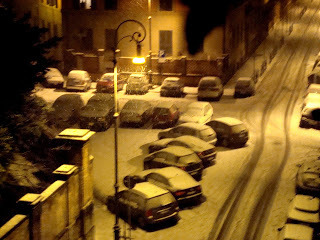
Next morning, our geraniums were buried under some 50 cm of snow and Rome looked like it had moved to Finland:
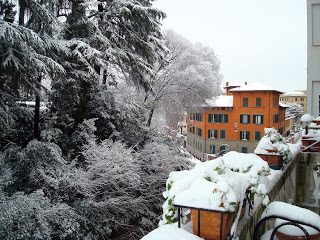
I ran down to the street and this is what I discovered:
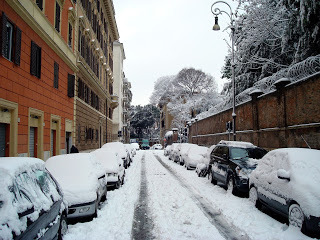
Yes, it was already 11 am, and there had been no attempt to clear the street. No salt, no sand, no shovels, nothing. Some people tried (uselessly) to free their cars:
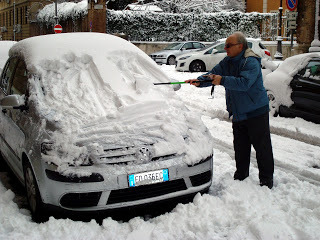
Motorcycles? Forget them! Here's one girl busy recording with her camera what must be her scooter. Nice color lady!
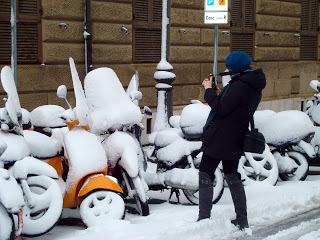
When I got to Piazza San Giovanni, people stood there waiting for a bus that wasn't coming (they said they'd been there for 45 minutes) and the taxi stand - usually filled with a dozen cabs - was empty except for one daredevil:
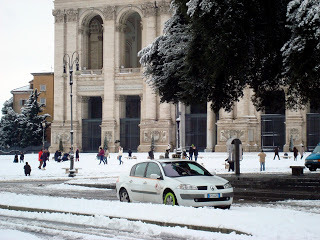
He told me he had wrapped a "sock" around his front tires - it's that yellow stuff:

He said it was easy to put on, that it gripped the road pretty well as long as the snow didn't turn to slush. If it did (and now it certainly looked like it would as the day wore on and temperatures went up), it would become ineffective as the slush insinuated itself in the "sock". He assured me he planned to drive very very slowly...
Walking further into Piazza San Giovanni, I was taken by the beauty:
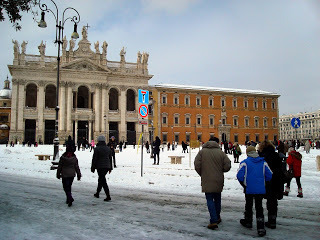
Note that most people walked around in ski outfits. I only saw one lady in a fur coat...And of course snowmen were made left and right, including this one which shows that in Italy, art is never far away:
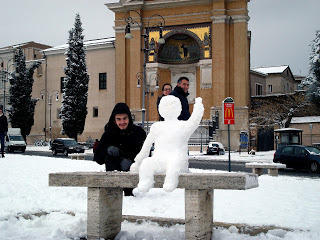
The young man kneeling behind is (I presume) the artist. And here's a truly spectacular view of the old Roman walls - first built by the ancient Romans and expanded through the Middle Ages:
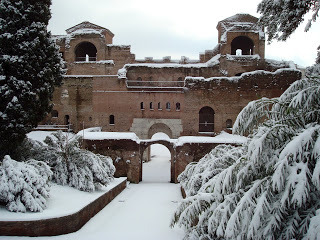
Walking back home, I noticed the milk truck in front of our neighborhood supermarket:

It got there three hours late! As did the bread. And when I walked in, I discovered empty shelves: no meat, no milk, no eggs. People were assaulting the "gastronomia" counter where they sell select hams, cheese, pasta sauces and the like:

It felt like World War III. Everyone was buying huge amounts, acting as if no truck would ever reach Rome again. Of course, the truck drivers strike last week had already put everyone on edge. And the media later reported that dozens of villages in the mountains were cut off. Actually tens of thousands of people in Italy are going without electricity and water, sometimes up to three days...So Romans are (as always) rather privileged people...
But there's little doubt that the city authorities did nothing to clear up the streets...except for distributing free shovels to the citizens, expecting them to do the work themselves! Here's a neighbor who got one of those plastic shovels, proudly showing off:

And then - this being Italy - he is happy like a kid playing with it, throwing snow at his friends:
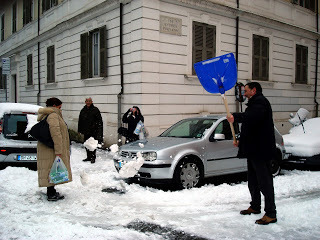
Not too much clearing of the sidewalks (though the next day he told me he had helped free several cars)...We had a late lunch and once again resorted to our favorite defense strategy: good food. This time it was sautéed shrimp in a white wine sauce with black olives and cherry tomatoes (if you'd like to have the recipe, click here):

By 3 pm, because this is Rome, the sun was back shining again on the trees in front of our windows:

Emergency over? No, the media warned us that temperatures would drop and we could expect ice. The next morning, Sunday 5 February, some snow had melted away, but much remained and all very icy and slippery:
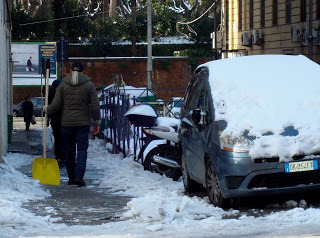
This guy (holding the yellow shovel and walking away) tried to clear the sidewalk but it was iced over and hard and he gave up before finishing the job.
When I walked in the supermarket to get some bread and potatoes, I was in for a big surprise:

Empty shelves, worse than the day before! No fruits and vegetables, no bread, no milk, no water, nothing. The media are reassuring: trucks should reach Rome by Monday - the only people in trouble (as always) are those in the mountains, without road access, electricity or water...
Meantime, the streets around us continued to be covered with snow and ice with no sign of any help coming from the city authorities. And small wonder: on the 12 o'clock news, I heard a special team of 400 people had been sent out with heavy equipment to clear the football stadium and area around it because of the big Roma-Inter match coming up in the afternoon.
In Italy, your best bet is to be a soccer fan!
For more pictures, go to my Picasa Album: click here.
Related articlesSnow whitened St. Peter's Basilica, in Rome (hazimiai.wordpress.com)
Stilettos in the snow... only in Rome! (photoblog.msnbc.msn.com)
Rome Struggles With More Snow; Govt Shovels Issued (abcnews.go.com)
Gallery: Rome stunned by freak snowstorm (theprovince.com)
Colosseum Shut As Heavy Snowfall Hits Rome (news.sky.com)



It all started around 1 pm Friday February 3rd. Looking out the window of my living room, this is what I saw:

Giuseppe (my husband) and I wanted to go to a museum - forget it! We decided to stay home and console ourselves with good food:

Yes, for those of you who think I'm a die-hard beer drinker (because of my post on beer-drinking in Rome), you're in for a surprise! I love wine and this was a fantastic bottle - the last one in our cellar: a Brunello di Montalcino 1981. Yes, that's not a typo... ok, we drank it because it was so old: it needed drinking before going off (actually it was perfect). We had it with a little foie-gras followed by two scrumptious Italian cheeses: an aged Gorgonzola and a moist Taleggio. And with that, a perfect pear:

There's an old saying in Italy: "al contadino non far sapere quant'è buono il formaggio con le pere" (roughly: "don't tell peasants how well cheese goes with pears"). To me, it smacks of a historical example of the 1% showing disdain for the 99%!
By 3 pm, it began snowing real hard:
We heard on TV that people going home that night had been blocked for hours - up to 8 hours on the beltway ("raccordo annulare") circling Rome. Imagine, 8 hours trapped in your car! Many are said to have walked away, abandoning their car and creating a yet bigger traffic jam. That event actually marked the beginning of a wave of protests against the authorities, in particular the Mayor for not having listened to weather forecasts and not heeded the warnings issued by the "Protezione Civile" (the Italian State Agency for Emergency Aid/Protection of Civilians).
That night, that's how our street looked like as we went to bed:

Next morning, our geraniums were buried under some 50 cm of snow and Rome looked like it had moved to Finland:

I ran down to the street and this is what I discovered:

Yes, it was already 11 am, and there had been no attempt to clear the street. No salt, no sand, no shovels, nothing. Some people tried (uselessly) to free their cars:

Motorcycles? Forget them! Here's one girl busy recording with her camera what must be her scooter. Nice color lady!

When I got to Piazza San Giovanni, people stood there waiting for a bus that wasn't coming (they said they'd been there for 45 minutes) and the taxi stand - usually filled with a dozen cabs - was empty except for one daredevil:

He told me he had wrapped a "sock" around his front tires - it's that yellow stuff:

He said it was easy to put on, that it gripped the road pretty well as long as the snow didn't turn to slush. If it did (and now it certainly looked like it would as the day wore on and temperatures went up), it would become ineffective as the slush insinuated itself in the "sock". He assured me he planned to drive very very slowly...
Walking further into Piazza San Giovanni, I was taken by the beauty:

Note that most people walked around in ski outfits. I only saw one lady in a fur coat...And of course snowmen were made left and right, including this one which shows that in Italy, art is never far away:

The young man kneeling behind is (I presume) the artist. And here's a truly spectacular view of the old Roman walls - first built by the ancient Romans and expanded through the Middle Ages:

Walking back home, I noticed the milk truck in front of our neighborhood supermarket:

It got there three hours late! As did the bread. And when I walked in, I discovered empty shelves: no meat, no milk, no eggs. People were assaulting the "gastronomia" counter where they sell select hams, cheese, pasta sauces and the like:

It felt like World War III. Everyone was buying huge amounts, acting as if no truck would ever reach Rome again. Of course, the truck drivers strike last week had already put everyone on edge. And the media later reported that dozens of villages in the mountains were cut off. Actually tens of thousands of people in Italy are going without electricity and water, sometimes up to three days...So Romans are (as always) rather privileged people...
But there's little doubt that the city authorities did nothing to clear up the streets...except for distributing free shovels to the citizens, expecting them to do the work themselves! Here's a neighbor who got one of those plastic shovels, proudly showing off:

And then - this being Italy - he is happy like a kid playing with it, throwing snow at his friends:

Not too much clearing of the sidewalks (though the next day he told me he had helped free several cars)...We had a late lunch and once again resorted to our favorite defense strategy: good food. This time it was sautéed shrimp in a white wine sauce with black olives and cherry tomatoes (if you'd like to have the recipe, click here):

By 3 pm, because this is Rome, the sun was back shining again on the trees in front of our windows:

Emergency over? No, the media warned us that temperatures would drop and we could expect ice. The next morning, Sunday 5 February, some snow had melted away, but much remained and all very icy and slippery:

This guy (holding the yellow shovel and walking away) tried to clear the sidewalk but it was iced over and hard and he gave up before finishing the job.
When I walked in the supermarket to get some bread and potatoes, I was in for a big surprise:

Empty shelves, worse than the day before! No fruits and vegetables, no bread, no milk, no water, nothing. The media are reassuring: trucks should reach Rome by Monday - the only people in trouble (as always) are those in the mountains, without road access, electricity or water...
Meantime, the streets around us continued to be covered with snow and ice with no sign of any help coming from the city authorities. And small wonder: on the 12 o'clock news, I heard a special team of 400 people had been sent out with heavy equipment to clear the football stadium and area around it because of the big Roma-Inter match coming up in the afternoon.
In Italy, your best bet is to be a soccer fan!
For more pictures, go to my Picasa Album: click here.
Related articlesSnow whitened St. Peter's Basilica, in Rome (hazimiai.wordpress.com)
Stilettos in the snow... only in Rome! (photoblog.msnbc.msn.com)
Rome Struggles With More Snow; Govt Shovels Issued (abcnews.go.com)
Gallery: Rome stunned by freak snowstorm (theprovince.com)
Colosseum Shut As Heavy Snowfall Hits Rome (news.sky.com)


Published on February 05, 2012 09:24
February 3, 2012
I've just created a QuickQuiz - 5 Questions About Heredity
Here's the link to a QuickQuiz - 5 Questions About Heredity
Click it and play this QuickQuiz now and test your knowledge!The link takes you to Facebook but if you don't want to log in there, click the link on the game box here in the right top corner. It'll take you directly to the quiz which is on the www.fReado.com site with lots of giveaways, including free books, a Kindle and more.
The quiz will make you discover that some very famous people were impacted by genetic inheritance, perhaps some you never suspected like Jane Fonda or Queen Victoria.
If you're wondering why I picked heredity as a subject for the quiz, that's easy! It's something I've always been fascinated with: the issue of nature vs. nurture. Are we born as a clean slate and therefore become the product of our education and experience (nurture) or have we inherited family traits that determine who we are and how we act (nature)?
Anyone who's read my Fear of the Past Trilogy knows that's what the book is really about: the weight of heredity and whether one can shake it off and become free from the past.
We all have seen our parents or grandparents in our children. Don't you wonder sometimes who you really look like? If you look like someone in your family who was a happy, successful person, good for you! But suppose you realize you look like a family member who notoriously messed up his life, who had a tendency to love the wrong woman or sink in depression and alcoholism...or worse, committed suicide?
How would you feel then? In Fear of the Past, Tony Bellomo, a young Italo-American suffering from burnout undertakes a unique journey into self discovery: he falls in a Time Trap in Sicily (his deceased father's home) and meets the ghosts of his ancestors waiting for Judgment Day. You'd think this is a marvelous opportunity for Tony to learn more about which forebears he looks like and discover who he really is. Most of us can't go back 900 years like Tony... But this very knowledge will torment Tony in the worst possible way.
Here's the place where he found the ghosts of his ancestors roaming about: the Circolo di Conversazione, a "conversation club". It actually exists in Ragusa (but I've set it in Syracuse instead for reasons apparent to anyone reading the book). Such clubs existed all over Sicily in the 19th century; the Ragusa club is the one that inspired me to write the book...
Here it is from the outside, just down from the famous St. George Church in the centre of old Ragusa: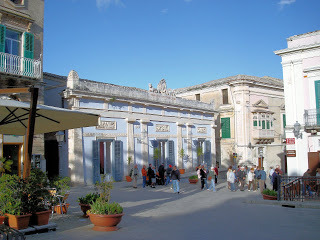
And inside:
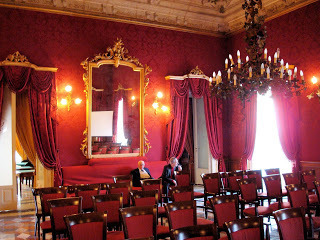
With red velvet curtains, gilded mirrors and chandeliers, it's a perfect place for ghosts and a marvelous opportunity for Tony to learn about himself... but a scary one. He discovers he shares everything - both looks and emotions - with a certain Francis Leckie, an English adventurer who settled in Sicily in the 1800s (he really did exist, the town of Floridia has a street with his name).
Francis Leckie was an attractive dare-devil and an innovative entrepreneur, but alas he failed in his life: he went bankrupt and the woman he loved, the beautiful Duchess of Floridia, left him for another...
When Tony meets the Duchess (a real historical character too) she mistakes him at first for her English lover since they look so much alike. Can love work between them?
But the story unfolds on another, deeper level. Tony worries that his resemblance to the Englishman marks him out as a failure. Can he avoid making the same mistakes?
The real question is: can Tony play the cards heredity has bestowed on him in a different way? Or is he condemned to repeat the mistakes of the past?
Do you know anyone who's the prisoner of his family heredity? Are we all condemned to repeat the past or is there a way to escape it? Tony, by the last page of the last book has found his way...Find out how he did it and be prepared for surprises: this novel takes you to many unpredictable places and situations!
 Available as ebooks:
Available as ebooks:
Book 1 of Fear of the Past trilogy at:AmazonBarnes & NobleiBookstoreSony Store
 Book 2 of Fear of the Past at:AmazonBarnes & NobleiBookstoreSony Store
Book 2 of Fear of the Past at:AmazonBarnes & NobleiBookstoreSony Store
 Book 3 of Fear of the Past at: AmazonBarnes & NobleiBookstoreSony Store
Book 3 of Fear of the Past at: AmazonBarnes & NobleiBookstoreSony Store
For those who prefer their books printed, it will be available end February on Amazon (all 3 books in one volume - 520 pages)
Related articlesEpigenetics: A Turning Point in our Understanding of Heredity (blogs.scientificamerican.com)



Click it and play this QuickQuiz now and test your knowledge!The link takes you to Facebook but if you don't want to log in there, click the link on the game box here in the right top corner. It'll take you directly to the quiz which is on the www.fReado.com site with lots of giveaways, including free books, a Kindle and more.
The quiz will make you discover that some very famous people were impacted by genetic inheritance, perhaps some you never suspected like Jane Fonda or Queen Victoria.
If you're wondering why I picked heredity as a subject for the quiz, that's easy! It's something I've always been fascinated with: the issue of nature vs. nurture. Are we born as a clean slate and therefore become the product of our education and experience (nurture) or have we inherited family traits that determine who we are and how we act (nature)?
Anyone who's read my Fear of the Past Trilogy knows that's what the book is really about: the weight of heredity and whether one can shake it off and become free from the past.
We all have seen our parents or grandparents in our children. Don't you wonder sometimes who you really look like? If you look like someone in your family who was a happy, successful person, good for you! But suppose you realize you look like a family member who notoriously messed up his life, who had a tendency to love the wrong woman or sink in depression and alcoholism...or worse, committed suicide?
How would you feel then? In Fear of the Past, Tony Bellomo, a young Italo-American suffering from burnout undertakes a unique journey into self discovery: he falls in a Time Trap in Sicily (his deceased father's home) and meets the ghosts of his ancestors waiting for Judgment Day. You'd think this is a marvelous opportunity for Tony to learn more about which forebears he looks like and discover who he really is. Most of us can't go back 900 years like Tony... But this very knowledge will torment Tony in the worst possible way.
Here's the place where he found the ghosts of his ancestors roaming about: the Circolo di Conversazione, a "conversation club". It actually exists in Ragusa (but I've set it in Syracuse instead for reasons apparent to anyone reading the book). Such clubs existed all over Sicily in the 19th century; the Ragusa club is the one that inspired me to write the book...
Here it is from the outside, just down from the famous St. George Church in the centre of old Ragusa:

And inside:

With red velvet curtains, gilded mirrors and chandeliers, it's a perfect place for ghosts and a marvelous opportunity for Tony to learn about himself... but a scary one. He discovers he shares everything - both looks and emotions - with a certain Francis Leckie, an English adventurer who settled in Sicily in the 1800s (he really did exist, the town of Floridia has a street with his name).
Francis Leckie was an attractive dare-devil and an innovative entrepreneur, but alas he failed in his life: he went bankrupt and the woman he loved, the beautiful Duchess of Floridia, left him for another...
When Tony meets the Duchess (a real historical character too) she mistakes him at first for her English lover since they look so much alike. Can love work between them?
But the story unfolds on another, deeper level. Tony worries that his resemblance to the Englishman marks him out as a failure. Can he avoid making the same mistakes?
The real question is: can Tony play the cards heredity has bestowed on him in a different way? Or is he condemned to repeat the mistakes of the past?
Do you know anyone who's the prisoner of his family heredity? Are we all condemned to repeat the past or is there a way to escape it? Tony, by the last page of the last book has found his way...Find out how he did it and be prepared for surprises: this novel takes you to many unpredictable places and situations!
 Available as ebooks:
Available as ebooks:Book 1 of Fear of the Past trilogy at:AmazonBarnes & NobleiBookstoreSony Store
 Book 2 of Fear of the Past at:AmazonBarnes & NobleiBookstoreSony Store
Book 2 of Fear of the Past at:AmazonBarnes & NobleiBookstoreSony Store Book 3 of Fear of the Past at: AmazonBarnes & NobleiBookstoreSony Store
Book 3 of Fear of the Past at: AmazonBarnes & NobleiBookstoreSony StoreFor those who prefer their books printed, it will be available end February on Amazon (all 3 books in one volume - 520 pages)
Related articlesEpigenetics: A Turning Point in our Understanding of Heredity (blogs.scientificamerican.com)


Published on February 03, 2012 02:08
January 31, 2012
Italian Design's Best Kept Secret: How the Old Helps the New
On a recent Sunday evening I was given an unusual insight in what makes Italian design so successful. It happened at the fair for young Italian designers, the A.I.Fair (it stands for Artisanal Intelligence) held on 29 January in Emperor Hadrian's Temple in the suggestive Piazza di Pietra in old Rome.
A eureka moment!
But I didn't know that when I got there with my husband around 7 pm. It was a beautiful night, with a young moon in the clear sky and I felt relaxed and romantic. And mildly curious. Here's the Temple:
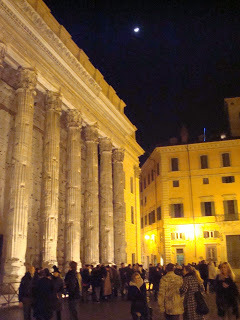
Majestic! And here's the entrance, hidden among the ancient columns:
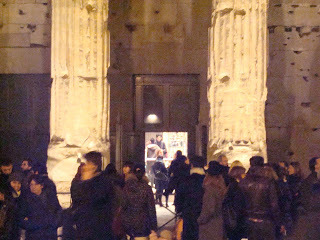
Once in, we were met by a noisy and colorful crowd, with a big video screen at one end of the vast hall:
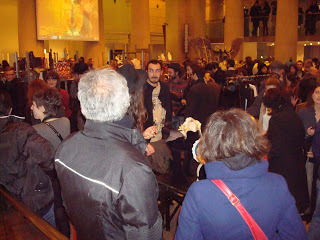
Lots of stands manned by young people, all showing the most eclectic and inventive array of design and fashion products, ranging from weird hats:

to a variety of rings:

necklaces:

shoes:

Hummm, a bit heavy, those heels...and when I climbed up to the mezzanine that girds the big hall, I discovered dresses like this:

and like this:

Wondering whether this particular one was meant for a one-breast Amazon, I walked over to the balustrade and took a shot of the hall seen from above:
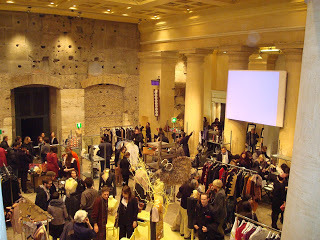
Here you can really appreciate how the "old helps the young": this country has amazing architectural remnants of its long and glorious history that can be used to showcase the work of innovative, young designers. No doubt they're good and inventive, but this kind of environment really helps to set their work off! Old Hadrian called on to support the inventiveness of young Romans...The Temple allure makes the design ideas look elegant and trendy, even if some of them probably aren't.
It's quite a trick to pull off and no doubt one of the elements that help explain the success of Italian design worldwide. Yes, it is one of Italian design's best kept secret: how they are able to exploit the old to the benefit of the new. And of course, how they are inspired by the past to look to the future and invent news ways to do old things.
In one corner of the hall, I came across this surprising stand that confirmed my insight. Here it is:

Set between two small columns, a big "C" on a black background stands out - the trademark for Archivio Cicconi, a collection of over 7 million photographs spanning the whole of the 20th century. It is reminiscent of Gucci's double "G" but much starker in its simplicity. Next two it are two of the products one young and inspired artist has ingeniously derived from the old photographs, with a process that was in use at the end of the 19th century.
Here's the artist, Eduardo Cicconi:

He explained to us that since these photos are reproduced with a handmade process, no two photos are ever alike, thus ensuring that it is an unrepeatable artwork. And they can be made any size, even big enough to cover a whole wall in your living room!
Here is one, derived from a photograph of models in 1948:

And here's the bizarre zeppelin floating above Piazza Venezia, looking surprisingly ominous:

And here's the most extraordinary of the three - a procession of nuns walking through Rome in 1950, like a black pond filled with white balls:

And here's a close up of the material on which the photographs are printed - 100% cotton and you can clearly see the brush work that leaks beyond the edge of the photo:

There were also other interesting things on the Cicconi Archives stand, like this old camera:

There was also a pile of the latest Cicconi Archives' catalogue (published by the Allori Foundation). Here's the cover:

That's Gregory Peck on the roof of the Hassler Hotel in 1959, with St. Peter's in the background. There are lots of photos of famous American actors inside, including my favorite jazz player:

Love his sandals! And here's a very young Ursula Andress (we're in1958) listening to "Pino er Pasticciere" (Pino the pastry cook) - I met Pino years later, in 1985, looking much older but still singing beautifully:

In case you're wondering how this extraordinary collection of photographs was put together, it was the work of Eduardo's father, Alberto Cicconi. By the time he was finished, the Italian Ministry of Cultural and Environmental Heritage recognized it as being of "significant historical interest". For 20 years, Cicconi was Bettino Craxi's photographer (Craxi is the famous Socialist leader who died in 2000 while in exile in Tunisia). In addition to his own collection (some 645,000 negatives), Cicconi pulled together three other major photo collections all spanning the 20th Century in Italy, including the one put together by Alberto Cartoni who was Mussolini's personal photographer.
I can't resist recounting here the unusual way in which the Cartoni collection was recovered.
One day, Cicconi went to meet Cartoni's grandson with the objective of buying his collection which was said to have few but very important photos. While talking to him, Cicconi became aware that something was oozing out of the wall. He tapped on it and it sounded hollow. They pulled down the wall and were met with a strong smell of must, film and photographs: this was Cartoni's dark room! He had walled it up and hidden his collection in it (which turned out to be quite big: some 460,000 glass negatives and negatives) because, after the war, with the flare-up of hatred for Mussolini, he felt hunted and was afraid his collection would be either taken away from him or destroyed.
It's a good thing that some people in Italy have so much respect for their past...
At 8 pm the fair closed down and we walked the streets around the Temple, looking for a restaurant:
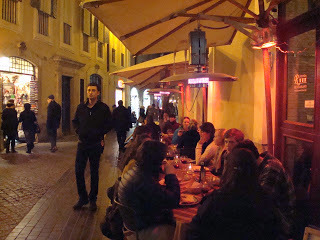
Imagine people eating outdoors in January! It wasn't cold, sure, but I didn't feel like it (too damp). We walked on past the Pantheon:
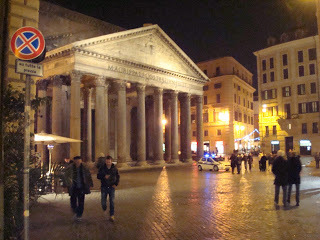
Round the corner, in Via del Seminario, we came to a restaurant my husband remembered from his Dolce Vita days (!):
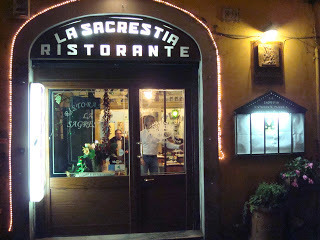
He didn't recognize the owner - small wonder, this restaurant was started in 1946 and now it's the third generation in the family running it:

As you can see, lovingly looking after customers...And the pizza (so my husband says) was just as good as the one he used to eat back in the 1960s:
 It was certainly delicious, thin and crisp and tasty (on the left, these are zucchini flowers): a fitting end to a wonderful Roman evening stroll!
It was certainly delicious, thin and crisp and tasty (on the left, these are zucchini flowers): a fitting end to a wonderful Roman evening stroll!
For more pictures of that memorable stroll, click here: The A.I. Fair, January 29, 2012



A eureka moment!
But I didn't know that when I got there with my husband around 7 pm. It was a beautiful night, with a young moon in the clear sky and I felt relaxed and romantic. And mildly curious. Here's the Temple:

Majestic! And here's the entrance, hidden among the ancient columns:

Once in, we were met by a noisy and colorful crowd, with a big video screen at one end of the vast hall:

Lots of stands manned by young people, all showing the most eclectic and inventive array of design and fashion products, ranging from weird hats:

to a variety of rings:

necklaces:

shoes:

Hummm, a bit heavy, those heels...and when I climbed up to the mezzanine that girds the big hall, I discovered dresses like this:

and like this:

Wondering whether this particular one was meant for a one-breast Amazon, I walked over to the balustrade and took a shot of the hall seen from above:

Here you can really appreciate how the "old helps the young": this country has amazing architectural remnants of its long and glorious history that can be used to showcase the work of innovative, young designers. No doubt they're good and inventive, but this kind of environment really helps to set their work off! Old Hadrian called on to support the inventiveness of young Romans...The Temple allure makes the design ideas look elegant and trendy, even if some of them probably aren't.
It's quite a trick to pull off and no doubt one of the elements that help explain the success of Italian design worldwide. Yes, it is one of Italian design's best kept secret: how they are able to exploit the old to the benefit of the new. And of course, how they are inspired by the past to look to the future and invent news ways to do old things.
In one corner of the hall, I came across this surprising stand that confirmed my insight. Here it is:

Set between two small columns, a big "C" on a black background stands out - the trademark for Archivio Cicconi, a collection of over 7 million photographs spanning the whole of the 20th century. It is reminiscent of Gucci's double "G" but much starker in its simplicity. Next two it are two of the products one young and inspired artist has ingeniously derived from the old photographs, with a process that was in use at the end of the 19th century.
Here's the artist, Eduardo Cicconi:

He explained to us that since these photos are reproduced with a handmade process, no two photos are ever alike, thus ensuring that it is an unrepeatable artwork. And they can be made any size, even big enough to cover a whole wall in your living room!
Here is one, derived from a photograph of models in 1948:

And here's the bizarre zeppelin floating above Piazza Venezia, looking surprisingly ominous:

And here's the most extraordinary of the three - a procession of nuns walking through Rome in 1950, like a black pond filled with white balls:

And here's a close up of the material on which the photographs are printed - 100% cotton and you can clearly see the brush work that leaks beyond the edge of the photo:

There were also other interesting things on the Cicconi Archives stand, like this old camera:

There was also a pile of the latest Cicconi Archives' catalogue (published by the Allori Foundation). Here's the cover:

That's Gregory Peck on the roof of the Hassler Hotel in 1959, with St. Peter's in the background. There are lots of photos of famous American actors inside, including my favorite jazz player:

Love his sandals! And here's a very young Ursula Andress (we're in1958) listening to "Pino er Pasticciere" (Pino the pastry cook) - I met Pino years later, in 1985, looking much older but still singing beautifully:

In case you're wondering how this extraordinary collection of photographs was put together, it was the work of Eduardo's father, Alberto Cicconi. By the time he was finished, the Italian Ministry of Cultural and Environmental Heritage recognized it as being of "significant historical interest". For 20 years, Cicconi was Bettino Craxi's photographer (Craxi is the famous Socialist leader who died in 2000 while in exile in Tunisia). In addition to his own collection (some 645,000 negatives), Cicconi pulled together three other major photo collections all spanning the 20th Century in Italy, including the one put together by Alberto Cartoni who was Mussolini's personal photographer.
I can't resist recounting here the unusual way in which the Cartoni collection was recovered.
One day, Cicconi went to meet Cartoni's grandson with the objective of buying his collection which was said to have few but very important photos. While talking to him, Cicconi became aware that something was oozing out of the wall. He tapped on it and it sounded hollow. They pulled down the wall and were met with a strong smell of must, film and photographs: this was Cartoni's dark room! He had walled it up and hidden his collection in it (which turned out to be quite big: some 460,000 glass negatives and negatives) because, after the war, with the flare-up of hatred for Mussolini, he felt hunted and was afraid his collection would be either taken away from him or destroyed.
It's a good thing that some people in Italy have so much respect for their past...
At 8 pm the fair closed down and we walked the streets around the Temple, looking for a restaurant:

Imagine people eating outdoors in January! It wasn't cold, sure, but I didn't feel like it (too damp). We walked on past the Pantheon:

Round the corner, in Via del Seminario, we came to a restaurant my husband remembered from his Dolce Vita days (!):

He didn't recognize the owner - small wonder, this restaurant was started in 1946 and now it's the third generation in the family running it:

As you can see, lovingly looking after customers...And the pizza (so my husband says) was just as good as the one he used to eat back in the 1960s:
 It was certainly delicious, thin and crisp and tasty (on the left, these are zucchini flowers): a fitting end to a wonderful Roman evening stroll!
It was certainly delicious, thin and crisp and tasty (on the left, these are zucchini flowers): a fitting end to a wonderful Roman evening stroll!For more pictures of that memorable stroll, click here: The A.I. Fair, January 29, 2012


Published on January 31, 2012 07:39
January 27, 2012
Italy in Revolt: First Protest against Monti's Government... a Flop!
Italy in revolt! Today, January 27 2012, starting at 12:30 pm, people converged on Piazza San Giovanni in Rome to protest against Monti's package of measures to fix the debt problem and stimulate the economy. The police, expecting the worst, had cordoned off the streets and a helicopter surveyed the scene:

Here the protesters march down the Viale Carlo Felice, coming from Piazza della Repubblica where they had convened earlier this morning:
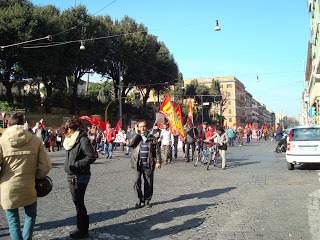
Most of them are middle-aged, some are even old and there's only one group of young people, about fifty of them, walking behind a sign which says "Students and Workers United - General Strike".

Note the hammer and sickle: long time, no see!
Actually there were very few such reminders of Communism, although I did note some leftovers from radical parties, weakily waiving antiquated flags, and a couple of young TAV protesters (TAV is the high speed train that is supposed to link Italy to France and has roused the ire of environmentalists ). Perhaps they were few because at present, some 25 TAV protesters are in prison, after the violent demonstrations last summer that left hundreds wounded.
By one pm, the protesters had gathered in the Piazza and gleefully let off some smoke bombs, just to add a little ambience:
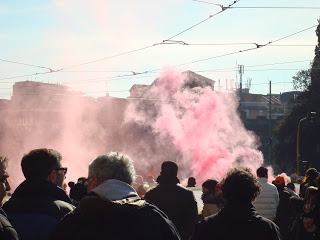
Looks threatening but it's only pink smoke!
Here they are listening to their union leaders (these were mostly from the public transport system unions - local trains, buses and subways are stopped today for a 24 hour strike - a nuisance of course, but everyone's used to these strikes that conveniently start after 8.30 am so people can get to work and are suspended between 5 and 8 pm so people can go back home):
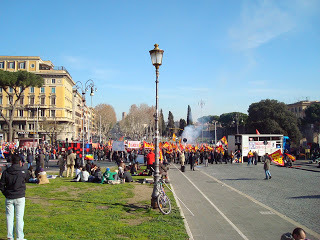
As you can see, there are very few people...And if you look at the piazza in the other direction, that's what you see:
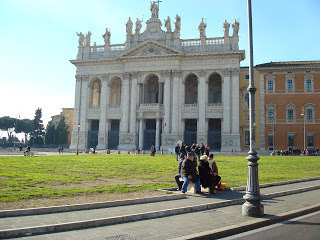
I'm not kidding you: the piazza was empty!
This protest was a total flop - maybe four or five hundred people came, no more. A far cry from the way Piazza San Giovanni had been filled to the brim some two years ago when there was a mega protest against Berlusconi. You couldn't even edge in your way into the piazza from the side streets!
All told, this was just a pleasant outing on a sunny day, with a couple of t-shirt vendors. Here's one:

And here's the t-shirt I would buy (it reads: "and I pay!"):

Yes, echoes of Occupy Wall Street: it's always the common man - the 99 percent - who ends up paying! By the way, that's a picture of the famous actor Toto, still an icon in Italy (and rightly so).
You know what are the real problems of life in Rome this week? Lack of fruits and vegetables! Because 10 percent (that's right only ten percent) of truck drivers have blocked the roads from vegetable collection points, we are getting no fruits and vegetables from Southern Italy (the area that produces the best tasting stuff!).
So supermarket shelves have looked like this all week:

And like this:

The asparagus you glimpse on the right come from Peru, by air and via Milano. Because we get all the stuff from Milano: Northern Italy hasn't been blocked.
A pity, because the tomatoes, eggplants and other veggies all come from Spain that unfortunately is very good at using modern agricultural techniques and packaging/distribution methods and very bad at producing tasty produce: tomatoes and eggplants are all precisely the same size and color and utterly tasteless. Actually, when you eat them, you can't tell the difference between a tomato and an eggplant!
Apart from the unpleasantness of being unable to locate good produce, what makes me really angry is that a minority of truck drivers can manage to block half a country - some twenty five million people - and curtail our rights as consumers to get the food we are used to eating.
All because they have to pay a little more tax and participate in salvaging the Italian economy. Haven't they got any sense of civic responsibility? What kind of people are these, always thinking of making more and more money? Because I'm quite certain that these truck drivers make a nice, steady income. They just won't admit to it, that's all. And nobody is investigating their real income, neither journalists nor the Finance Police (Guardia di Finanza - true, sometimes they do check on people, but it's all rather sporadic). Truck drivers are part of the privileged class (along with restaurant and bar owners) that never pay the taxes they really owe the government.
This said, the problem in Italy is that the ultra rich don't pay either. Landowners, doctors, lawyers, accountants etc - nobody pays the taxes owed.
Tax evasion is so universal that it is the real disease Italy is suffering from.
If the one percent gave the good example of paying the taxes it owes - the way it does in Northern Europe, in Norway, in Germany etc - then maybe the 99 percent (and among them the restaurant owners, the taxi drivers and trucksters who constitute niches of privilege) would follow suit...And Italy would at last function as a modern state.
Related articlesItaly in Literal Revolt (lewrockwell.com)
Monti warns of austerity protests (bbc.co.uk)
Italy's Monti to unveil crisis plan amid strikes (seattlepi.com)
Italian unions plan general strike (news.smh.com.au)




Here the protesters march down the Viale Carlo Felice, coming from Piazza della Repubblica where they had convened earlier this morning:

Most of them are middle-aged, some are even old and there's only one group of young people, about fifty of them, walking behind a sign which says "Students and Workers United - General Strike".

Note the hammer and sickle: long time, no see!
Actually there were very few such reminders of Communism, although I did note some leftovers from radical parties, weakily waiving antiquated flags, and a couple of young TAV protesters (TAV is the high speed train that is supposed to link Italy to France and has roused the ire of environmentalists ). Perhaps they were few because at present, some 25 TAV protesters are in prison, after the violent demonstrations last summer that left hundreds wounded.
By one pm, the protesters had gathered in the Piazza and gleefully let off some smoke bombs, just to add a little ambience:

Looks threatening but it's only pink smoke!
Here they are listening to their union leaders (these were mostly from the public transport system unions - local trains, buses and subways are stopped today for a 24 hour strike - a nuisance of course, but everyone's used to these strikes that conveniently start after 8.30 am so people can get to work and are suspended between 5 and 8 pm so people can go back home):

As you can see, there are very few people...And if you look at the piazza in the other direction, that's what you see:

I'm not kidding you: the piazza was empty!
This protest was a total flop - maybe four or five hundred people came, no more. A far cry from the way Piazza San Giovanni had been filled to the brim some two years ago when there was a mega protest against Berlusconi. You couldn't even edge in your way into the piazza from the side streets!
All told, this was just a pleasant outing on a sunny day, with a couple of t-shirt vendors. Here's one:

And here's the t-shirt I would buy (it reads: "and I pay!"):

Yes, echoes of Occupy Wall Street: it's always the common man - the 99 percent - who ends up paying! By the way, that's a picture of the famous actor Toto, still an icon in Italy (and rightly so).
You know what are the real problems of life in Rome this week? Lack of fruits and vegetables! Because 10 percent (that's right only ten percent) of truck drivers have blocked the roads from vegetable collection points, we are getting no fruits and vegetables from Southern Italy (the area that produces the best tasting stuff!).
So supermarket shelves have looked like this all week:

And like this:

The asparagus you glimpse on the right come from Peru, by air and via Milano. Because we get all the stuff from Milano: Northern Italy hasn't been blocked.
A pity, because the tomatoes, eggplants and other veggies all come from Spain that unfortunately is very good at using modern agricultural techniques and packaging/distribution methods and very bad at producing tasty produce: tomatoes and eggplants are all precisely the same size and color and utterly tasteless. Actually, when you eat them, you can't tell the difference between a tomato and an eggplant!
Apart from the unpleasantness of being unable to locate good produce, what makes me really angry is that a minority of truck drivers can manage to block half a country - some twenty five million people - and curtail our rights as consumers to get the food we are used to eating.
All because they have to pay a little more tax and participate in salvaging the Italian economy. Haven't they got any sense of civic responsibility? What kind of people are these, always thinking of making more and more money? Because I'm quite certain that these truck drivers make a nice, steady income. They just won't admit to it, that's all. And nobody is investigating their real income, neither journalists nor the Finance Police (Guardia di Finanza - true, sometimes they do check on people, but it's all rather sporadic). Truck drivers are part of the privileged class (along with restaurant and bar owners) that never pay the taxes they really owe the government.
This said, the problem in Italy is that the ultra rich don't pay either. Landowners, doctors, lawyers, accountants etc - nobody pays the taxes owed.
Tax evasion is so universal that it is the real disease Italy is suffering from.
If the one percent gave the good example of paying the taxes it owes - the way it does in Northern Europe, in Norway, in Germany etc - then maybe the 99 percent (and among them the restaurant owners, the taxi drivers and trucksters who constitute niches of privilege) would follow suit...And Italy would at last function as a modern state.
Related articlesItaly in Literal Revolt (lewrockwell.com)
Monti warns of austerity protests (bbc.co.uk)
Italy's Monti to unveil crisis plan amid strikes (seattlepi.com)
Italian unions plan general strike (news.smh.com.au)


Published on January 27, 2012 07:31
January 21, 2012
The American Credit Rating Agencies are in Trouble in Italy: is it the Beginning of the End?
 Image via Wikipedia
Image via WikipediaThe American credit rating agencies are often seen as the villains of the financial world, particularly by governments whose debt is downgraded. The credit rating agencies have held hostage the Euro-zone governments, starting first with Greece and moving on steadily through the Euro-zone until France was knocked off its triple A on January 13, together with Italy and a number of other Euro-zone countries, sparing only the Netherlands, Belgium, Luxemburg and of course Germany. But Germany for the first time got a negative outlook to it's Triple A - suggesting that with any downturn in the European economic outlook, even Germany risked its Triple A.
Then on 16 January S&P downgraded the European Bailout Fund (the EFSF - European Financial Stability Facility) because it is backed by downgraded countries, chief among them France...In practice, this does not affect the EFSF lending capacity of €440 million that is in place until the European Stability Mechanism becomes operational in July 2012, but it certainly doesn't help. It has all the look of a quite unnecessary move on the part of S&P.
Europeans are becoming restless and even the German Foreign Affairs Minister, Guido Westerwelle, muttered on his way to Greece that a European Rating Agency should be created. "The time has come for Europe to prove that it can resist credit rating agencies" he told the press.
But the Italians are not waiting for any new agency to be formed. According to the Italian newspaper Repubblica (reported in 20 January edition ), the Procura (Public Prosecutor's Office) of the cities of Trani and Milan launched an investigation on 16 January and the Italian Finance Police - the Guardia di Finanza - struck, raiding the Milan office of Standard & Poor's, taking away computers and email exchanges. In addition, the Consob (the Italian equivalent of the Securities and Exchange Commission) has issued a warning to both agencies, S & P and Moody's, inviting them to "adjust their procedures" as they are "not in line" with European Union guidelines (see news on consob.it site).
 Image via Wikipedia
Image via WikipediaSo far it seems that seven persons are under investigation: three analysts from S&P, one from Moody's and three directors from both agencies, all accused of having spread in May, June and July 2011, news that were "not correct and in any case false and tendentious regarding the strength of the Italian economic-financial and banking system". To this was added the "episode" of Friday 13 January: the unexpected bump faced by the Italian bond auction that morning.
In some ways, what happened that day could have become much worse if the markets had not already discounted to a large extent the downgrading of Italy's debt. Nonetheless, the bond auction that morning was not covered by bids to the expected extent, and the infamous "spread" (difference) between the Italian and German bond prices rose once again, reaching the danger zone of 500 base points - and this in spite of the fact that Italy had taken all the required measures to face the Euro crisis and satisfy investors.
This odd behavior found an explanation by 4 pm that day, when rumors widely circulated that France and Italy were about to be downgraded that very evening by S&P. Blame was laid by the Trani Prosecutor at the doorstep of S&P.
Why all the legal fuss? First, because by law, Standard & Poor's is supposed to inform the concerned authorities of its downgrade before anyone else and certainly before the markets, yet somehow the news had spread earlier...
Add to that the fact that the downgrade of Italy was universally perceived as excessive, even wrong in the face of Monti's government efforts and highly praised austerity and growth measures: Italy was downgraded by two steps and not one, from A to BBB+.
Do the Italians have a case against the rating agencies? The agencies, as might be expected, loudly claim their innocence. But the Trani Prosecutor and his office have prepared their case very carefully, pooling expert opinions from respected economists as well as from personalities in the world of finance and banking, including testimonies from ex-Prime Minister and European Commissioner Romano Prodi, Mario Draghi, the new head of the European Central Bank and Giulio Tremonti, the Finance Minister in Berlusconi's last government and Torino University Professor.
So it's their word against the agencie's. Moreover, the numerous linkages between the rating agencies and banks who are their customers (in particular Goldman Sachs, JP Morgan and Morgan Stanley) and investment and hedge funds such as Black Rock, State Street, Capital World Investors, Vanguard, Fidelity etc have become the subject of striking diagrams in Italian newspapers and elsewhere, where the lines cross each other, embedding the agencies in a spider network...
That is probably the most dangerous aspect of this story for credit rating agencies: their unhealthy relationships with the world of banking and investment - their natural customers - are at last revealed to public opinion, voiding their claim of independence and transparency.
What is needed is a truly independent rating agency...As Chakrabortty of the UK Guardian observed (see article below), "the agencies are neither accurate nor merely observers - yet they bully governments around the world and make billions doing so. The obvious solution would be to take this public service into public hands. Let's have a ratings agency run by the UN, funded by pooled contributions from both lenders and borrowers. It should be the only one to have preferential access to data from corporates and countries. Let's make the ratings business a utility rather than a semi-cartel that intimidates elected politicians and rakes in excess profits. It's time to break up the bullying double act."
Strong words...with which I fully agree. Because unfortunately one cannot do without credit rating agencies: any borrower, whether corporate or government, that needs to go to the bond market needs a credit rating report to show investors. It's a necessary function, but it need not be in private hands that twist it to their own advantage...
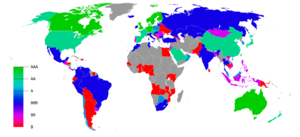 S&P's World: Green = AAA; Turquoise = AA; Blue = BBB...Image via Wikipedia
S&P's World: Green = AAA; Turquoise = AA; Blue = BBB...Image via WikipediaRelated articlesStandard & Poor's Downgrades European Bailout Fund (blippitt.com)
Credit rating agency downgrades nine Euro-zone countries (greenreview.blogspot.com)
Euro Rate: Germany will Create European Rating Agency (marketforexvyatski.wordpress.com)
Ignore the Rating Agencies (lewrockwell.com)
Don't blame the ratings agencies for the eurozone turmoil | Ha-Joon Chang (guardian.co.uk)
Why You Still Can't Trust Rating Agencies (bigthink.com)
European Central Bankers Criticize Role of Rating Agencies (nytimes.com)
Time to take control of the credit rating agencies | Aditya Chakrabortty (guardian.co.uk)


Published on January 21, 2012 11:36
January 16, 2012
Occupy Wall Street? No, Occupy Rome and March to Athens!
Tents have come up by the dozen all over Rome, with posters of protest. Was it another Occupy Wall Street in the making?
On January 14, I decided to take a stroll and find out. I came up to the old walls of Rome at the San Giovanni gate:
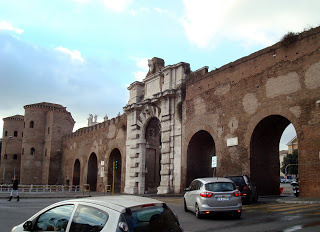
Crossing the gate, you arrive upon the vast piazza of San Giovanni, with the Church hiding behind the trees:
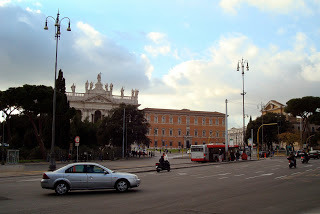
Across from it is St. Francis' statue, raising his arms to the sky and...covered with posters and surrounded by tents:
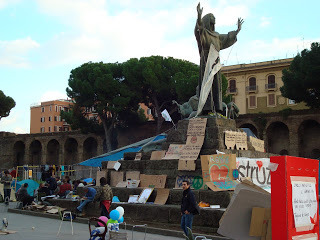
What do the posters say? There were more than I could take in, but the protest messages were quite clear:
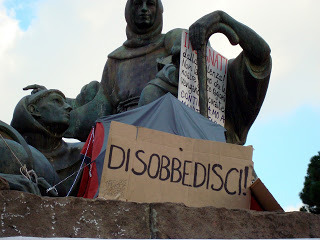 Disobey!
Disobey!

Here you have to interpret a little: made in China = slavery, referring no doubt to the low pay and hard wok conditions of Chinese workers. And next to it in Spanish: This is not Woodstock, This is (a fight for) Justice (literally: this is not Woodstock, this is Right).
Far from not having any political ideas, they seem to be boiling over with them (with possibly some not quite "baked"). Here is one of the posters announcing their political activities:
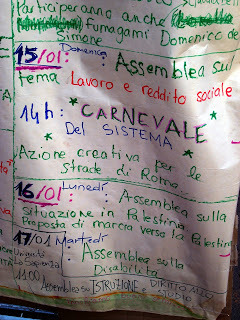
It announces that on Sunday 15 January, they plan on having an assembly on the theme of Work and Social Income followed at 2 pm by a "*Carnival of the System* Creative Action Through the Streets of Rome". To be followed on Monday 16 by a "Meeting on the Situation in Palestine" and a "Proposal to [organize] a March to Palestine". Given the tension in Gaza, I wonder how many will decide to do that...
In case you missed the overall objective, here it is, spread in big letters across St Francis' statue:
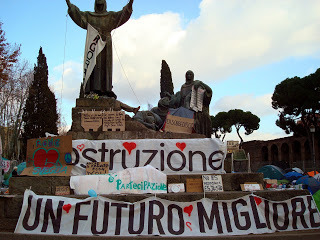
Yes, it reads: "[For the] Construction [of a] Better Future". These kids certainly have a clear agenda: overhaul society and make it better. And just in case you didn't get it, here is the place they dedicate to the role of books and ideas:

The two posters in the back make it clear: "Because Books transmit the Revolution to [future] Generations" and "Because Change is Achieved through Culture".
At that point, I wanted to know more about them. I spotted a couple of girls painting posters on the sidewalk and walked up to them:

I approached the girl who's turning our back to us in this picture and asked her what she was doing. A multiple poster, she said. If you look closely at the picture, you'll see she had completed the drawing of a missile and was now working on painting a peace dove. She showed me the sketch she was working from:

The message here needs no translation!
I first started speaking to her in Italian and she shook her head, answering in Spanish. I asked her in that language whether she was coming from Spain and she said she came from France. At that point we both laughed and fell into French (my mother tongue).
She told me there were about 80 of them in the encampment and that they came from everywhere: Australia, Bangladesh, Spain, Peru... Looking at them, anyone can see they come from all over:
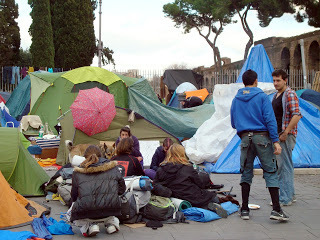
She said she had joined them here in Rome on 5 January - and that there was a hard core of some 30 participants that had started from Nice (France) in November. They plan to walk down through Italy all the way to Bari and then cross over on a ferry headed for Greece. They expect to reach Athens by March, stopping along the way in all major towns to express their "indignation" - as they were doing here in Rome during their two week stay, organizing meetings and marches through town, like the one planned for Sunday, from Piazza San Giovanni to Piazza del Popolo.
I asked her whether she was staying with them till Athens but she shook her head, no, she was a design student in a Paris university and had to work and study.
So this is the March of the Indignados to Athens. When they stop on the way they are joined by others like this girl who give them a hand for a few days - thus clarifying to me one of the mysteries of the Occupy Wall Street protest movements. Since they last so long, I thought they included only the unemployed or otherwise disoccupied young. But no, that is not the case. Those who work join them temporarily, swelling their ranks when they stop in big cities and adding fuel to their enthusiasm...And while overwhelmingly young, there are some older people too, like this man on the foreground, busy drawing a poster:
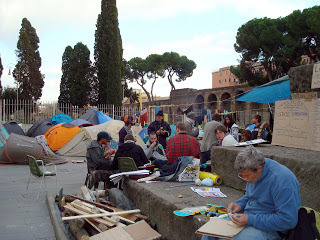
I asked my French friend whether the police had bothered them and she shook her head. Actually people in the neighborhood were nice and supportive,she said. One had even lent them his apartment so they could have warm showers. And food was regularly brought to them every day:
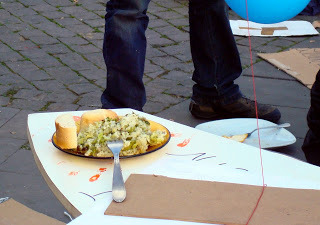
Certainly the mild winter weather in Rome and Athens helps maintain the momentum of such protest movements. I imagine that for the moment, with snow and sleet, there are very few such movements in the States...
Is there any around you?
Post-scriptum: On Sunday January 15, the march across Rome from Piazza San Giovanni to Piazza del Popolo took a wrong turn. A small group (about 50, mostly French and Spanish) went as far as St Peter's and tried to set up a protest encampment, only to be dispersed by the police in riot gear. A couple of people got hurt but the plaza in front of St. Peter's was cleared.
It seems one of the protesters was disguised in a pope's outfit and bore the slogan "indignant heart", a reference to the Spanish Indignados movement. They naively expected support from the Vatican. Instead, Father Federico Lombardi, the Vatican spokesman, said that "considering the actions undertaken and the language used, these Indignados evidently wanted to use the piazza in an improper way, not in keeping with the spirit of the place."
It goes to show that some disobediance is ok but you can't win them all!
Related articlesOccupy Vatican protesters evicted by police (guardian.co.uk)



On January 14, I decided to take a stroll and find out. I came up to the old walls of Rome at the San Giovanni gate:

Crossing the gate, you arrive upon the vast piazza of San Giovanni, with the Church hiding behind the trees:

Across from it is St. Francis' statue, raising his arms to the sky and...covered with posters and surrounded by tents:

What do the posters say? There were more than I could take in, but the protest messages were quite clear:
 Disobey!
Disobey!
Here you have to interpret a little: made in China = slavery, referring no doubt to the low pay and hard wok conditions of Chinese workers. And next to it in Spanish: This is not Woodstock, This is (a fight for) Justice (literally: this is not Woodstock, this is Right).
Far from not having any political ideas, they seem to be boiling over with them (with possibly some not quite "baked"). Here is one of the posters announcing their political activities:

It announces that on Sunday 15 January, they plan on having an assembly on the theme of Work and Social Income followed at 2 pm by a "*Carnival of the System* Creative Action Through the Streets of Rome". To be followed on Monday 16 by a "Meeting on the Situation in Palestine" and a "Proposal to [organize] a March to Palestine". Given the tension in Gaza, I wonder how many will decide to do that...
In case you missed the overall objective, here it is, spread in big letters across St Francis' statue:

Yes, it reads: "[For the] Construction [of a] Better Future". These kids certainly have a clear agenda: overhaul society and make it better. And just in case you didn't get it, here is the place they dedicate to the role of books and ideas:

The two posters in the back make it clear: "Because Books transmit the Revolution to [future] Generations" and "Because Change is Achieved through Culture".
At that point, I wanted to know more about them. I spotted a couple of girls painting posters on the sidewalk and walked up to them:

I approached the girl who's turning our back to us in this picture and asked her what she was doing. A multiple poster, she said. If you look closely at the picture, you'll see she had completed the drawing of a missile and was now working on painting a peace dove. She showed me the sketch she was working from:

The message here needs no translation!
I first started speaking to her in Italian and she shook her head, answering in Spanish. I asked her in that language whether she was coming from Spain and she said she came from France. At that point we both laughed and fell into French (my mother tongue).
She told me there were about 80 of them in the encampment and that they came from everywhere: Australia, Bangladesh, Spain, Peru... Looking at them, anyone can see they come from all over:

She said she had joined them here in Rome on 5 January - and that there was a hard core of some 30 participants that had started from Nice (France) in November. They plan to walk down through Italy all the way to Bari and then cross over on a ferry headed for Greece. They expect to reach Athens by March, stopping along the way in all major towns to express their "indignation" - as they were doing here in Rome during their two week stay, organizing meetings and marches through town, like the one planned for Sunday, from Piazza San Giovanni to Piazza del Popolo.
I asked her whether she was staying with them till Athens but she shook her head, no, she was a design student in a Paris university and had to work and study.
So this is the March of the Indignados to Athens. When they stop on the way they are joined by others like this girl who give them a hand for a few days - thus clarifying to me one of the mysteries of the Occupy Wall Street protest movements. Since they last so long, I thought they included only the unemployed or otherwise disoccupied young. But no, that is not the case. Those who work join them temporarily, swelling their ranks when they stop in big cities and adding fuel to their enthusiasm...And while overwhelmingly young, there are some older people too, like this man on the foreground, busy drawing a poster:

I asked my French friend whether the police had bothered them and she shook her head. Actually people in the neighborhood were nice and supportive,she said. One had even lent them his apartment so they could have warm showers. And food was regularly brought to them every day:

Certainly the mild winter weather in Rome and Athens helps maintain the momentum of such protest movements. I imagine that for the moment, with snow and sleet, there are very few such movements in the States...
Is there any around you?
Post-scriptum: On Sunday January 15, the march across Rome from Piazza San Giovanni to Piazza del Popolo took a wrong turn. A small group (about 50, mostly French and Spanish) went as far as St Peter's and tried to set up a protest encampment, only to be dispersed by the police in riot gear. A couple of people got hurt but the plaza in front of St. Peter's was cleared.
It seems one of the protesters was disguised in a pope's outfit and bore the slogan "indignant heart", a reference to the Spanish Indignados movement. They naively expected support from the Vatican. Instead, Father Federico Lombardi, the Vatican spokesman, said that "considering the actions undertaken and the language used, these Indignados evidently wanted to use the piazza in an improper way, not in keeping with the spirit of the place."
It goes to show that some disobediance is ok but you can't win them all!
Related articlesOccupy Vatican protesters evicted by police (guardian.co.uk)


Published on January 16, 2012 01:27
January 13, 2012
France and Italy Downgraded by the Credit Rating Agencies: a Plot Against the Euro?
The anger was palpable here in Italy as news of the Standard & Poor's downgrade spread this evening, Friday 13th. Anger was perhaps more muted in France and the French Finance Minister Baroin declared on French TV that he had half-expected it. And that in any case the credit agencies could not dictate French policy and that France would not undergo further austerity measures.
 Actually, a lot of people had expected the downgrade and to some extent the markets had probably already digested the news because their reaction was relatively subdued. The other two major agencies, Fitch and Moore's, were expected to follow soon. France lost its triple A rating by one notch and Italy was down two notches to BBB+ with a "negative" outlook. All Euro-zone countries were downgraded except Germany, Belgium, the Netherlands and Luxemburg. Mind you Germany maintained its triple A but got a "negative" outlook.
Actually, a lot of people had expected the downgrade and to some extent the markets had probably already digested the news because their reaction was relatively subdued. The other two major agencies, Fitch and Moore's, were expected to follow soon. France lost its triple A rating by one notch and Italy was down two notches to BBB+ with a "negative" outlook. All Euro-zone countries were downgraded except Germany, Belgium, the Netherlands and Luxemburg. Mind you Germany maintained its triple A but got a "negative" outlook.
Commentators across the political spectrum in Italy pointed to Prime Minister Monti's courageous package of austerity measures. You could sense the disappointment: after all, big efforts had been made - in the order of €30 billions. The downgrading seemed to overlook the fact that Italy has one of the most solid banking sectors in Europe. For example, Italian banks hold some €750 million of "toxic" Greek bonds as compared with several billions said to be held by banks in France, Germany and the UK. Moreover, Italy presently enjoys a healthy public debt situation, with tax revenues reportedly flowing in at a higher rate than current payments on the debt.
Others pointed to another worrying dimension to the downgrading of the French debt: since France was originally one of the triple A rated Euro-zone governments guaranteeing the future European Financial Stability Fund (EFSF) designed to come in aid of Euro-zone governments in difficulty, its downgrading was seen as a bad omen for the future of the Euro.
How important is this? Frankly, I believe not that much. At this point in time, what the European Central Bank does (or doesn't do) is far more important for the health of the Euro than whatever role the EFSF might be able to play in future. More on this in a moment.
Another bad omen is the breakdown of the Greek government talks with private banks to renegotiate its debt. In practice, this could be interpreted as tantamount to a Greek default. This bit of news was overshadowed by the credit downgrading news, but from a practical point of view it is far more worrying. After all, credit rating agencies' reputation is not exactly golden: these are the same agencies that gave a few years ago a triple A to Enron and to American banks in spite of their subprime mortgage activities...And credit rating agencies get paid by their customers (banks etc) for this type of rating whereas the ratings on a country's sovereign debt are given out free.
One may well wonder about such a business model that is predicated on a rather improbable wall separating the agencies' work on sovereign debt from that on private debt.
By Friday night, a common statement was expected from Brussels but as I write it hasn't come yet. One can expect the Eurogroup Ministers of Finance to express disdain and contest the downgrading. They might even hint at creating a European Credit Rating Agency. Many see a "European" agency as the proper counter move against the "American" agencies.
Apart from the chauvinistic satisfaction it might give some people, I don't believe a European credit agency would serve to change the rules of the game.
First it would need to establish a reputation for independence. If it fails to do so, it would be useless - just as useless as the Chinese credit rating agency is. No one follows what the Chinese agency says because everyone is convinced it is subservient to the Chinese government.
Second, there would be a need to change investment rules for many if not most big institutional investors (pension funds etc). This is the crux of the credit agency problem: a lot of institutional investors are obliged to follow investment rules that include respecting the ratings given by the "big" three agencies. So when Italy loses its A rating and goes into the B class, it can expect that a whole lot of investors that might have bought its bonds in future won't be able to do so anymore.
The solution? For the Euro, there is an urgent need to make investors AND credit rating agencies understand that the Euro is collectively defended and protected. It makes no sense at all to maintain the triple A credit rating for some countries like Germany and lower it for all the other Euro members.
Because if France and Italy go down, you can bet that Germany will too. It may well be the biggest European economy and the healthiest in terms of employment and exports, but France and Italy taken together are much bigger than Germany.
There is no way that Germany can sustain the Euro on its own. Nor for that matter can it get out of the Euro. If Germany tried to get out, leaving aside the cost and logistical mess caused by tearing up the Euro, one can expect the reborn Deutsche Mark to shoot up. It would probably to double the current level of the Euro, effectively killing off all German exports. Whereas, as of now, with a weak Euro with respect to the dollar, it's all to the benefit of German exports.
No, such a mega-scenario is not credible.
The only problem and the real one is and remains Greece. The reason why talks have broken down with the European big banks (French, German etc) said to be holding Greek toxic bonds is simply that they probably...no longer hold these bonds! Rumors have been circulating that they had offloaded their bonds to private hedge funds located in London and elsewhere. So now all those banks look "clean" and the Greek bonds are in private hands somewhere and nobody knows where. But the investors who hold them are savvy types: I'm willing to bet they got them at say around 40% of value (or even less) and expect Greece to pay them at 50% (that's the rate that was reportedly under discussion) or higher. So in a few months they will have made tons of money...while the Greek GNP keeps contracting further and further under the weight of austerity measures.
Is that what Germany wants for its Euro partners?
It is high time that the European political class stop talking about creating new European institutions such as the EFSF and concentrate instead on allowing the one institution that exists, the European Central Bank (ECB), to function as it should. It is incoherent to expect the ECB to fight inflation when the problem is recession and deflation. The Germans should understand this.
The ECB chart does say the Bank is to fight inflation but it also says the Bank is supposed to insure the stability of the Euro. That means, regardless of what the Germans think, that the Bank must defend the Euro with all and every means available to a central bank.
When will the European Central Bank become independent from German diktaats?
 Model of New ECB Building to be Completed in 2014
Model of New ECB Building to be Completed in 2014



 Actually, a lot of people had expected the downgrade and to some extent the markets had probably already digested the news because their reaction was relatively subdued. The other two major agencies, Fitch and Moore's, were expected to follow soon. France lost its triple A rating by one notch and Italy was down two notches to BBB+ with a "negative" outlook. All Euro-zone countries were downgraded except Germany, Belgium, the Netherlands and Luxemburg. Mind you Germany maintained its triple A but got a "negative" outlook.
Actually, a lot of people had expected the downgrade and to some extent the markets had probably already digested the news because their reaction was relatively subdued. The other two major agencies, Fitch and Moore's, were expected to follow soon. France lost its triple A rating by one notch and Italy was down two notches to BBB+ with a "negative" outlook. All Euro-zone countries were downgraded except Germany, Belgium, the Netherlands and Luxemburg. Mind you Germany maintained its triple A but got a "negative" outlook.Commentators across the political spectrum in Italy pointed to Prime Minister Monti's courageous package of austerity measures. You could sense the disappointment: after all, big efforts had been made - in the order of €30 billions. The downgrading seemed to overlook the fact that Italy has one of the most solid banking sectors in Europe. For example, Italian banks hold some €750 million of "toxic" Greek bonds as compared with several billions said to be held by banks in France, Germany and the UK. Moreover, Italy presently enjoys a healthy public debt situation, with tax revenues reportedly flowing in at a higher rate than current payments on the debt.
Others pointed to another worrying dimension to the downgrading of the French debt: since France was originally one of the triple A rated Euro-zone governments guaranteeing the future European Financial Stability Fund (EFSF) designed to come in aid of Euro-zone governments in difficulty, its downgrading was seen as a bad omen for the future of the Euro.
How important is this? Frankly, I believe not that much. At this point in time, what the European Central Bank does (or doesn't do) is far more important for the health of the Euro than whatever role the EFSF might be able to play in future. More on this in a moment.
Another bad omen is the breakdown of the Greek government talks with private banks to renegotiate its debt. In practice, this could be interpreted as tantamount to a Greek default. This bit of news was overshadowed by the credit downgrading news, but from a practical point of view it is far more worrying. After all, credit rating agencies' reputation is not exactly golden: these are the same agencies that gave a few years ago a triple A to Enron and to American banks in spite of their subprime mortgage activities...And credit rating agencies get paid by their customers (banks etc) for this type of rating whereas the ratings on a country's sovereign debt are given out free.
One may well wonder about such a business model that is predicated on a rather improbable wall separating the agencies' work on sovereign debt from that on private debt.
By Friday night, a common statement was expected from Brussels but as I write it hasn't come yet. One can expect the Eurogroup Ministers of Finance to express disdain and contest the downgrading. They might even hint at creating a European Credit Rating Agency. Many see a "European" agency as the proper counter move against the "American" agencies.
Apart from the chauvinistic satisfaction it might give some people, I don't believe a European credit agency would serve to change the rules of the game.
First it would need to establish a reputation for independence. If it fails to do so, it would be useless - just as useless as the Chinese credit rating agency is. No one follows what the Chinese agency says because everyone is convinced it is subservient to the Chinese government.
Second, there would be a need to change investment rules for many if not most big institutional investors (pension funds etc). This is the crux of the credit agency problem: a lot of institutional investors are obliged to follow investment rules that include respecting the ratings given by the "big" three agencies. So when Italy loses its A rating and goes into the B class, it can expect that a whole lot of investors that might have bought its bonds in future won't be able to do so anymore.
The solution? For the Euro, there is an urgent need to make investors AND credit rating agencies understand that the Euro is collectively defended and protected. It makes no sense at all to maintain the triple A credit rating for some countries like Germany and lower it for all the other Euro members.
Because if France and Italy go down, you can bet that Germany will too. It may well be the biggest European economy and the healthiest in terms of employment and exports, but France and Italy taken together are much bigger than Germany.
There is no way that Germany can sustain the Euro on its own. Nor for that matter can it get out of the Euro. If Germany tried to get out, leaving aside the cost and logistical mess caused by tearing up the Euro, one can expect the reborn Deutsche Mark to shoot up. It would probably to double the current level of the Euro, effectively killing off all German exports. Whereas, as of now, with a weak Euro with respect to the dollar, it's all to the benefit of German exports.
No, such a mega-scenario is not credible.
The only problem and the real one is and remains Greece. The reason why talks have broken down with the European big banks (French, German etc) said to be holding Greek toxic bonds is simply that they probably...no longer hold these bonds! Rumors have been circulating that they had offloaded their bonds to private hedge funds located in London and elsewhere. So now all those banks look "clean" and the Greek bonds are in private hands somewhere and nobody knows where. But the investors who hold them are savvy types: I'm willing to bet they got them at say around 40% of value (or even less) and expect Greece to pay them at 50% (that's the rate that was reportedly under discussion) or higher. So in a few months they will have made tons of money...while the Greek GNP keeps contracting further and further under the weight of austerity measures.
Is that what Germany wants for its Euro partners?
It is high time that the European political class stop talking about creating new European institutions such as the EFSF and concentrate instead on allowing the one institution that exists, the European Central Bank (ECB), to function as it should. It is incoherent to expect the ECB to fight inflation when the problem is recession and deflation. The Germans should understand this.
The ECB chart does say the Bank is to fight inflation but it also says the Bank is supposed to insure the stability of the Euro. That means, regardless of what the Germans think, that the Bank must defend the Euro with all and every means available to a central bank.
When will the European Central Bank become independent from German diktaats?
 Model of New ECB Building to be Completed in 2014
Model of New ECB Building to be Completed in 2014 

Published on January 13, 2012 15:45



